A passion for farming in Tempie Village

66-year-old Cheryl Shep herd is a resident of Tempie Village and envisions having two shade houses in the near future. In the meantime, she is cultivating some traditional and non-traditional crops. In this photo, Cheryl shows off fresh cabbages from her gar den (Delano Williams photo)

Sunday, October 09, 2022
Boost to local artists!
Creative Titans to become fully operational here by January
CREATIVE Titans, owned by Guyanese-American music executive Ron André Elvis Telford, is expected to be fully operational in Guyana in January 2023 and has already purchased space for an office and pro fessional studio in Kings ton, Georgetown.


It’s surely a welcomed initiative by creatives in the local music industry, espe cially as Guyana does not have too many professional studios. “We will be creating international-level songs. We want to develop songwriters, producers and other artistes from the country,” Telford related during an interview with Pepperpot Magazine.
The goal of Creative Ti tans, based in the United States of America, is to find talent from all across the world, including Guyana, and hone such talent to the point that the artist may be able to secure a record or publishing deal.

Its aim is also to create a distribution company to pro vide a platform for artistes to release their music easily in Guyana, even if they do not get signed by the company.
So far, Telford has been in touch with various digi tal service platforms to get things like playlists stream lined. “Play listing is the most important part of music streaming because it creates a central location with some of the top songs for whatever
music category you’re into. It increases your chances of getting more streams which equate to more money for the artiste,” he explained, adding, “As of now, Guyana doesn’t really exist on the music an alytics chart because there’s not much data coming from it due to a lack of copyright.”
As such, the next few months will be spent promot ing the importance of copy right. With Guyana’s laws left unchanged for decades,

many aspects of it would need to be updated so that the company can be able to op erate in an effective manner.
Helping local musicians is something Telford is espe cially interested in owing to
the fact that Guyana is close to his heart. Leaving Guyana at about four years old, he has chosen not to forsake the land of his birth, hence would often travel home. “I have an immense love for Guyana

and I see a lot of creatives who have a ceiling as to how far they can go when it comes to being an artist because they don’t have that many re sources,” Telford explained.
“There are two forms of music which work for the Guyanese audience: Soca and Reggae/Dancehall. But the audience in Guyana isn’t the paying consumer. There are artistes that don’t want to do Soca or dancehall; they can do rock, pop, R&B, all these different genres that may not be number one in the country, but what happens is that they don’t have the resources to get their music out to other markets and that’s where we’ll come along.”
While not promising to save everyone’s career, the company will be there to give
II CHRONICLE PEPPERPOT Sunday, October 09, 2022
Telford (left) with Saint JHn (centre) and owner of Northern Touch Vintage Aly Jamal
SEE PAGE XVII
A 2 album deal was signed for Grammy-Winning Producer IzyBeats (cream shirt) with Believe Music UK
Developing A Lifelong Passion for Tourism
CANDACE Phillips re members eagerly stepping onto a steep hilly bank that overlooks the village of Ma sakenari in the Konashen Community-owned Con servation Area (Region 9) during a trip, where she marvelled at the largely self-sustained Indigenous community surrounded by pristine grasslands. For the nature enthusiast who is trailblazing a path in local tourism, it brings unending joy to experience a desti nation’s hidden gems in its history, culture, language, traditions and cuisine. She also enjoys sharing connec tions with the people living there while working to pave a way forward in building a robust and thriving commu nity-based tourism sector in Guyana.
Phillips, however, did not always envision taking on a lead role in tourism, although she had an innate love for the outdoors. Born in Santa Rosa, Moruca, Region One (Barima Waini), Phillips and her moth er, Marlene Viera, moved to Georgetown when she was an infant. “My mom was a single parent. She really tried to in still those values and push me toward my goals,” expressed Phillips, who shed light on the many sacrifices her mother made to ensure she received an education, particularly while attending the Bishop’s High School and to teach her to be unafraid in learning new things and facing challenges. “She wanted me to be the best I can be,” said Phillips.
By embracing the beauty of the outdoors even as a child, she would often wait in anticipation for trips to her grandmother, who lived in Moruca, Region One, to travel along the ‘99 turns’ on the Moruca river. “You’re
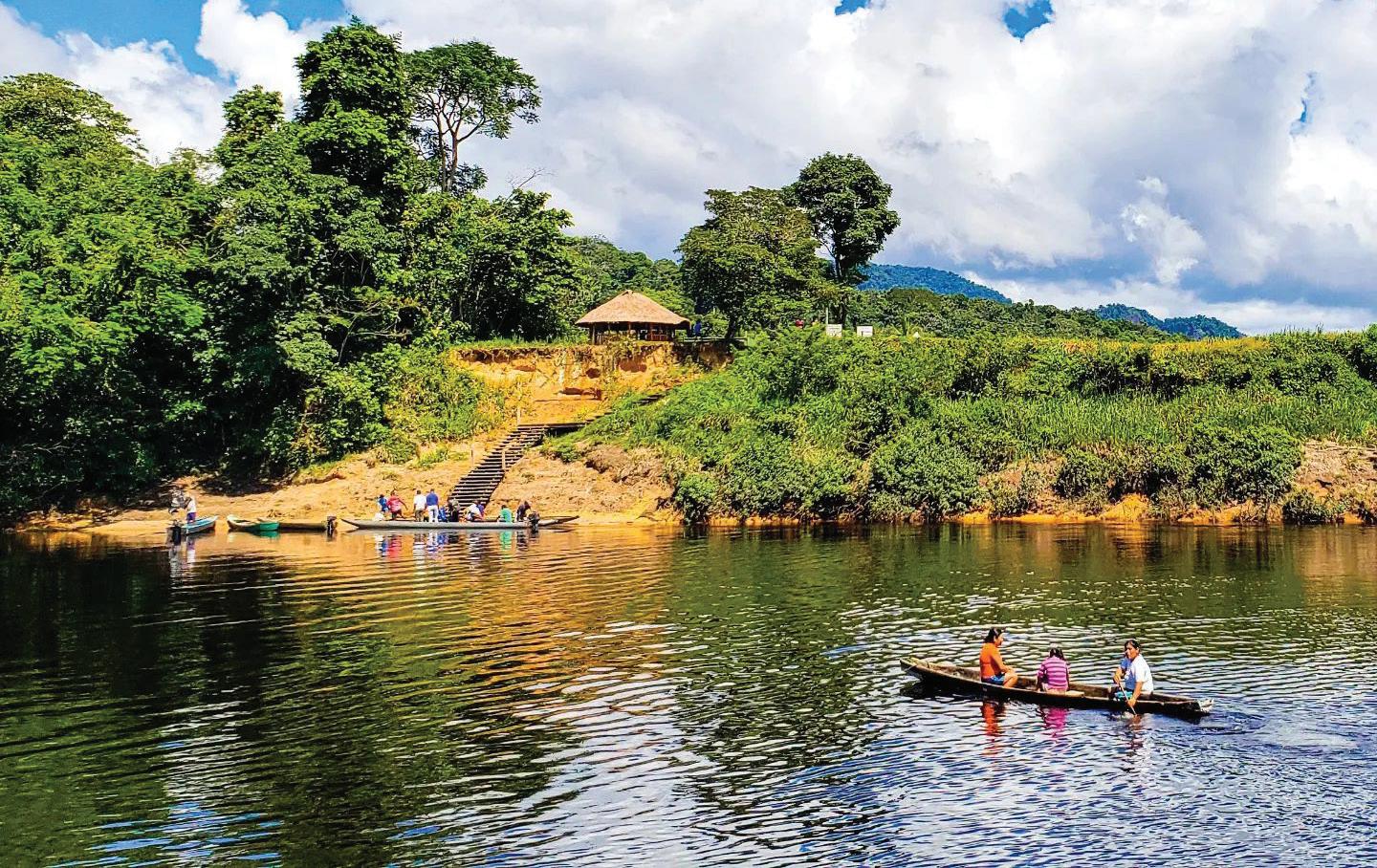
just going, with your boat ‘zip-zapping’ on the water way, and there is this moment of freedom,” she recalled vividly, before highlighting that the journeys awakened an adventurous spirit in her to know more about Guyana. Even though she knew she shared Arawak or Lokono an cestry, these trips also spurred a deeper interest in Phillips to try to understand her Indige nous heritage.
“We are really shaped by our environment. I felt a part of me was missing [and] be cause of the way I look. There are expectations on me. Peo ple say things like you don’t know how to paddle a canoe, fish or spin cotton, and I have said I might look like this, but I grew up in Georgetown. I felt that disconnect,” noted Phillips.
Driven by her ambition to become a business lawyer while remaining hopeful to foster a connection to her Indigenous roots, Phillips enrolled in the Economics programme at the University of Guyana (UG) and went on to pursue a Law degree. In her quest to learn more about her heritage and challenge stereo types about the Indigenous way of life, she joined the Amerindian Peoples Associ ation (APA) as a programme assistant. At APA, Phillips had considerable latitude to explore her Indigenous an cestry and discover the depth of Indigenous culture while she travelled to different com munities neatly tucked away across Guyana’s landscape.
She welcomed mother hood before long and opted to be a stay-at-home mom for a short time. Eventual ly, Phillips transitioned into journalism briefly when she became a reporter at the Sta broek News. After a while,

she decided the time was right to give her children the chance to enjoy the experience of nature and together they all moved to Aishalton, Region Nine (Rupununi) in 2013.
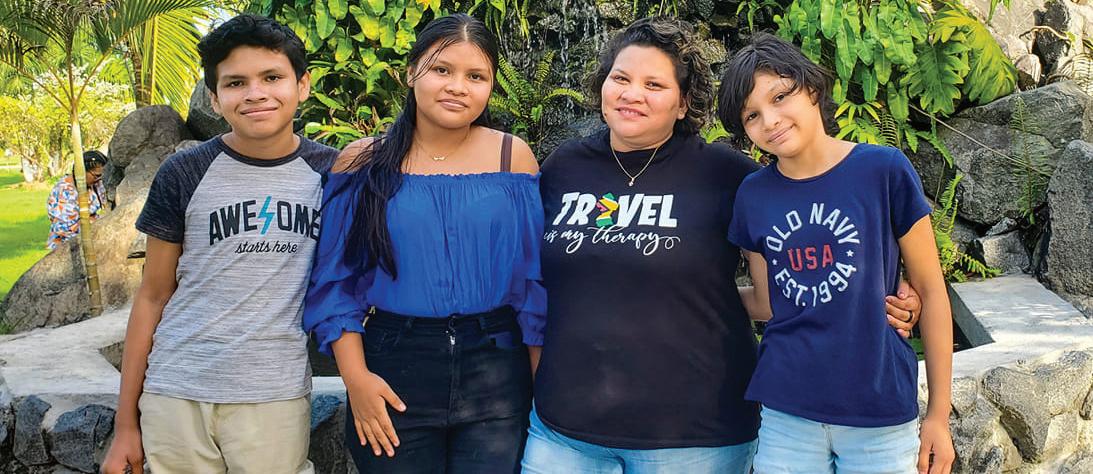
The Start of Something New: Visit Rupununi
The Rupununi offered a revitalising experience for Candace who developed a new and refreshing outlook on her life, career and moth erhood. She began teaching several subjects at Aishal ton Secondary School when Conservation International Guyana presented her with a window of opportunity to support the facilitation of a
tourism workshop at the sec ondary school for fifth form students.
“All I knew at that point was that I love travelling. I had no inkling about tourism and that was not my path in life,” she noted. By being purpose-driven to integrate taking action to sustain nature, bring awareness to Indigenous heritage and travel to meet
nator was to develop a coordinating mech anism for tourism de velopment in Region Nine, and the organisa tion created was ‘Visit Rupununi.’ Candace shared it was also a learning experience for her and to create ‘Visit Rupununi’, she invested a lot of time, resources and effort into reading and researching the Rupununi region, taking time to speak with Rupununi practitioners in the field for over 10 years and making the research applicable and work able to the Rupununi.
“It is a very crowning moment because it not only represents leaving a legacy. For me, that organisation represents sacrifice. It repre sented everything that I had to, all these stages I had to go through to be there, to lead, to really be recognised as some one who knows what’s going on in the tourism world. In the Rupununi, it symbolises every piece of paper I had to read, every book and every video I’ve had to look at it,” she remarked, before empha sising: “It also represents the first step in becoming who I am today.”
A Love for Tourism
Phillips attributes the time she spent living and working in the Rupununi to her broad ened socio-cultural perspec tives about a community and its immediate environment and creating a lasting positive impact in local communities that becomes an asset to local tourism. After three years, she
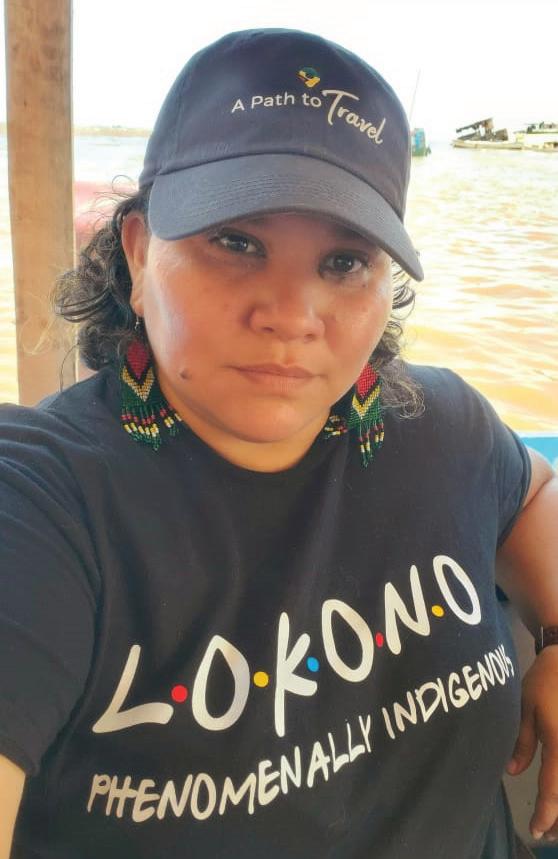
community-led and commu nity-owned resources, Phillips and her team work toward en suring that Guyana continues to boast a thriving communi ty-based tourism sector.
“Our work from the GTA side is simple to facilitate the process to help communities understand a bit more what they need to do step by step and to provide the guidance so they can achieve their tourism dreams and goals independent of the GTA and then become hosts. They can be able to promote and market their own products and develop their own itineraries,” Phillips detailed.
Another part of the pro cess involves inviting tour operators to familiarise them selves with a destination’s tourism products. She stated that these products are de signed to create a ‘wow’ effect and are developed for niche markets such as birdwatchers, adventurers, hikers, and peo ple who love riding All-terrain vehicles (ATVs) or horses, to name but a few.
Currently, the GTA product development team is engaging approximately 20 communities throughout Guyana’s ten administrative regions. Phillips proceed ed to highlight that product development is divided into community-based and a pri vate-sector-driven compo nents. During the product
new people and learn about communities and the way they thrive, in 2015, Phillips ac cepted an offer from Conser vation International Guyana to become a Tourism Coordina tor based in Lethem. Although she doubted her ability to fit this role, her determination to test her limits motivated her to accept the challenge.
The main deliverable of her role as tourism coordi
joined the Guyana Tourism Authority (GTA) and now serves as the Product Devel opment Manager.
Phillips indicated that product development is cen tred on the creation of new tourism products or expe riences in a particular des tination. As a field that is indispensable to the holistic tourism arena grounded by a framework that prioritises
assessment phase, the team usually visits locations within a community where, she said, they would walk along mud dy paths, climb mountains or even navigate caves better to understand the physical and geographic layout of the community.
Although the sector is progressing rapidly, Phillips noted that there is still a need
IIICHRONICLE PEPPERPOT ― Sunday, October 09, 2022 SEE PAGE IV
Candace Phillips (Photos by Candace Phillips)
A scene at Paruima village, Region Seven (A Path to Travel photo)
Candace and her children
Celebrating teachers and their achievements
WORLD Teachers Day was recently celebrated on Octo ber 5.
Teachers are an integral part of society and the bedrock in shaping the destiny and moulding the minds of young people and people in general.
This year, the Pepperpot Magazine focuses on the signif icant achievements and joy that teachers bring to the hearts of people worldwide.
The Pepperpot Magazine spoke with two teachers who have worked and continue to work feverishly and loyally in fulfilling their dream as educators.
1995, then Winfer Gardens from 2005 – 2020, where she retired.
During her interview with the Pepperpot Magazine, Chandler revealed that she preferred to teach Primary school pupils as against other categories of learners be cause, at the primary school level, the foundation would be given. She stated that it is different in secondary schools or tertiary institutions, where there is a need for specialisa tion in a subject area.
The dedicated teacher also noted that there are a lot of delinquent pupils and students, who often times find them selves not learning as they should, primarily because a lot of the issues they deal with originated at the home envi ronment.
She also noted that she believed that teaching should start in the home with the parents and that parents and teachers should have a strong relationship.
“Teaching is not only for now but is holistic, dealing with the whole child,” Chan dler told the Pepperpot Mag azine.
She believes that if there is greater cooperation from par ents, then things will be better within the system. She added that what keeps her going is that she receives inspiration from God and from the children when they excel.
“ Sometimes you as a teacher would feel down and out, but when you go into a classroom and see the smiles on a child’s face, it would make your day, or [when] a child draws or picks a flower from the school yard and says ‘Miss, I brought this for you,’ it makes you happy. It is not the expensiveness of the gift but the thought behind it,” Chandler expressed during
Developing A Lifelong ...
for intervention to reduce the pricing of and make afford able tourism experiences in Guyana. She pointed out that there is also a need for better conservation of the environ ment, especially to reduce littering and even enhance customer service.
“The exciting part is being out there in communities. You’re out there in commu nities. You’re getting to do trainings, (one part); we do culinary training, delivering quality service, tour guide training, and it just depends on the needs of the communi ty we will facilitate in support training,” she shared. By aim ing to work with a variety of stakeholders in a community, the team is able to fully un derstand the best possible way to transform the community’s tourism products and make
them marketable to local and international tourists.
Preserving Indigenous Heritage in Guyana Phillips believes that com munity-based tourism, in es sence, has been practised by the Indigenous peoples of Guyana for centuries. In her view, it is society that now places an extra burden on Indigenous communities to conform to modern tourism standards without demanding other local communities to upkeep the same standards.
In addition to this, she put forward that if ‘true’ sustain ability is the goal standard for local communities, then it is important when consulting these communities to engage them on developing tourism experiences to understand their way of life and how they protect and preserve their Indigenous heritage and resources and find unique
ways to shape development that will continue their pres ervation efforts. Furthermore, by doing this will also help to change stereotypes on Indigenous people and to eliminate certain societal biases that exist.
As an Indigenous woman in a mostly male-dominated field, Phillips has learned to overcome stereotypical as well as sexist remarks to hold her own in any space because she was determined to suc ceed. She noted with pride that schools in Aishalton have incorporated Wapishan, a traditional Indigenous lan guage, into the class curric ulum, which is essential in promoting and preserving Indigenous heritage.
A Path to Travel
If one frequently ac cesses social media, there is the likelihood of scrolling
her interview.
The joys of teach ing Grade Six pupils
Vijay Deonarine is another teacher who has been committed to her profession which she started more than 37 years ago. She began her career at the Enmore Primary School and is still teaching primary school pupils.

“I always wanted to be a teacher, and I taught my sister when I was just about nine years old. So I guess I was caught up with Primary education at a very early age. From a young age I would look at the teachers, and I said this is what I wanted to do,” Deonarine told the Pep perpot Magazine .
She expressed that she has been teaching at the Grade Six Level for a long time, and she really enjoys preparing those pupils to earn a place in a sec ondary school.

She noted, during her inter view, that she enjoys working with the Grade Six pupils, both the ‘high-fliers’ and those who aren’t ‘high-fliers’.
“I enjoy when they do well so that many pupils can get a chance to a Secondary educa tion,” Deonarine said.
She added that it is difficult to prepare pupils for the Grade Six Assessment when there would have been teaching deficiencies at the lower levels.
She noted that she would go back to the beginning and build on the principles to alleviate the problem.
She was the first in her family to join the teaching ranks; now, her daughter is a teacher at Enmore Primary School.
nous heritage.
past mesmerising land scape images that alluring ly captures the countless extraordinary wonders of the Rupununi under a page with the name: ‘A Path to Travel’. Phillips start ed photographing places she had visited in 2020 for
several reasons, mainly be cause she wanted the world to see Guyana’s natural beauty in its diverse people, culture and communities from a perspective that takes viewers along on an adventurous journey as well as experience Indige


Whenever Phillips ven tures out to travel whether on a work or leisure-related trip, she is inspired to view her surroundings from a lens that will not only invoke a sense of shared cultural pride, serenity and an appre ciation for humanity but also inspire viewers across the world to travel to destination Guyana and see its wonders for themselves. “I always want to enjoy the journey,” she said. For her leisure trips, Phillips takes along her three children, Jaedyn, Ethan and Madison in hopes that some day they will share her pro found love for travelling and tourism and become inclined to make an impact as well.
As Phillips turns heads with her ambitious drive in pioneering a path in local tourism, she has no doubt come full circle with her childhood passion: a love for travelling and meeting people.
IV CHRONICLE PEPPERPOT Sunday, October 09, 2022
Dawn Trotman Chandler began her career at Comenius Primary in 1988 and moved on to Sacred Heart Primary in
Dawn Trotman Chandler
Vijay Deonarine
FROM PAGE III
Candace Phillips as the Tourism Coordinator at Visit Rupununi after the organisation won a ‘Guyana Tourism Award’
‘Champ’ continues to shine
AT age 101, Hilton Lewis is among the oldest men in Guyana. Familiarly ad dressed as “Champ”, he is also one of the best-known Guyanese centenarians. Today, we throw the spot light on this retired sports educator in observance of the Day of the Elderly, which was observed on October 1, 2022. Uncle of former Commissioner of Police, the late Laurie Lewis, centenarian Hilton Lewis is still mobile, and enjoying reasonably good health. During his long and productive life, Hil ton Lewis has given and passed on lots of his own knowledge and experienc es to younger Guyanese, especially in track and field.
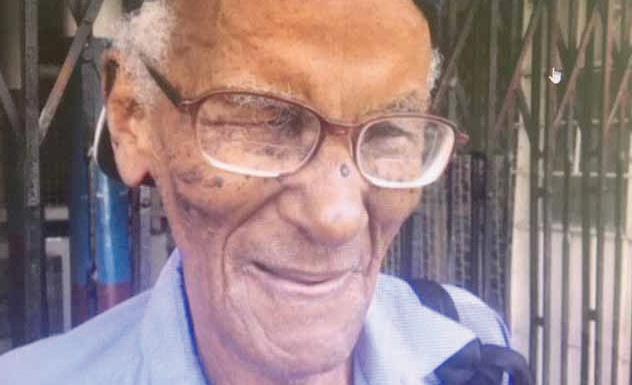
Since life itself could be equated with life and living and contributing to soci ety, then the decades-long sports coaching that Hilton Lewis has given to dozens and dozens of youngsters over the years can be equat ed to contributing to the na tion’s ongoing development, practically. Sadly, there are those Guyanese, fortunately not so many, who seem to miss the point regarding elder citizens, and would say, “he old” or “she old”, implying that at their stage in life, it is a minus for the individual who is beyond a certain age, and not con sidering the contributions which such citizens have made to the nation and con tinue to make, even though of a lesser amount.
Some years ago, a phrase was coined, “Age is just a number.” That is certainly something for Hilton Lew is and hundreds of Guya nese who are in their golden years, and are continuing to make their contributions to society can latch on to; a growing number, who, like Hilton Lewis, are 65 and older. Some are even centenarians. The question certainly is: Why is there this divide between some of the young citizens and the elderly here in Guyana, and being promoted by the few?
Is that not counter to the new motto of, “One Guyana?” If Guyanese agree that there is no divide, then this article will conclude right now. Un fortunately, there are issues to go into before its proper conclusion. If the negative is the fact that some elders overstay their welcome in certain positions of authori

ty, be they private or public, then such persons need to be advised to recognise that it is time for them to step aside and allow younger individ uals with fresh and more progressive ideas to get in the leadership positions.

Younger ones with the necessary physical and men tal energies are needed for certain positions, while there are other positions which are better occupied by mature and experienced persons. Organisations, including
is is of a different generation than the majority of his fel low Guyanese, but exactly because he has been around for so long and has seen and experienced so much of Guyana’s history, first-hand, he is positioned to give lots of his take, if you will, on the pulse of the country, and how best to deal with many of the challenges we face as a nation.
We are not saying that Hilton Lewis being 101 years of age makes him
there are those elders like Hilton Lewis who do not have the need for such assistance as yet. Even at 101, Hilton Lewis is bless
ed with enough physical and mental strength to get things done for him self. What a blessing!
governments, need young minds to make fresh de cisions. Guyana has been afforded such in 2020, with a government headed by a president in his mid-40s.
In a previous article, I mentioned that President Mohamed Irfaan Ali, who is age 42 at this time, is exactly half my age. Nonetheless, I find having discussions with him somewhat stimu lating; they readily and eas ily dovetail the past and the present, and clearly display that times gone should not be lost forever, but rather a means of knowing, to some degree, what to plan and ex pect in the future. Yes, things and times do change, but they are hardly ever totally unconnected. For example, Guyana’s current test crick eters can learn from the his tory of the game as played, let’s say, 20 years ago and even longer. Recently, I wrote an article in which I featured Sir Clive Lloyd and Shivnarine Chander paul, AA, two Guyanese test cricketers born in August. While the two Guyanese test players were of different eras, fans who enjoyed them both in performance on the field recognise that their different times and even styles of playing the game contributed meaningfully to Guyana’s cricketing history and glory.
Centenarian Hilton Lew
someone who has all the answers to the myriad of challenges that our country faces, but he can certainly give some reasonably good suggestions in a number of areas. Other Golden-agers are similarly gifted. Let’s not be so silly as to say, “he old”, and dismiss him and other Golden-agers totally out-of-hand. Let’s be smart enough to accept that, as the saying goes, “the older the violin, the sweeter the tune.” There is the other Guyanese saying, “New broom can sweep clean, but old broom knows all the corners.”
Actress and community activist, the late Mignon Lowe had established a “Youth serving the elderly” group at Grove, on the East Bank of Demerara some years ago. A number of the Youths would run errands such as doing shopping for Elders. Fetching water and other such errands. Each youth was assigned to an elder, who was served with dedication, respect and hon esty.
Most elders do not like to consider themselves as a burden to society; as such, whatever help is given to them must not be done in such a way as to take away their dignity as human be ings. Most youths who give their free service to elders are known to do so with love and respect. However,
VCHRONICLE PEPPERPOT ― Sunday, October 09, 2022
Hilton Lewis, one of the oldest living Guyanese males. (Photo by Francis Quamina Farrier)
Tempie Village
quiet, agriculture-based community
By Michel Outridge
LAST week the Pepperpot Magazine visited the quiet, breezy countryside village of Tempie, West Coast Berbice, to highlight the locals’ way of life.

Tempie Village is sand wiched between Britannia and #30 Village (Union) and it is fairly large with poultry, live stock and cattle farming, rice and cash crops farming being the primary source of income for villagers.
The village has vast back lands used primarily for rice cultivation and in the com munity, many large and smallscale farmers would sell their paddy to rice millers.
It was said that the village had its own rice mill years ago, but it was left abandoned when the owners migrated and the building fell apart slowly.
Tempie is a roadside vil
lage where the public road is and there are dwelling houses on both sides of the highway. There is only one internal street with small alleyways leading to sections of the vil lage that serve as a shortcut.
The community has four shops, no schools and no other facilities. These are sourced in neighbouring villages and children have to leave the village for school.
A handful of people hold jobs outside the village within both the private and public sectors and some are self-em ployed.
The people of Tempie are normal folk who have a very simple way of life which involves hard work and being industrious to earn.
They are also very friend ly, and welcoming and would even stop whatever they are doing to take a break and have a chat with visitors.
Even though Tempie isn’t
a spotlight community, the locals like it just that way. Simplicity and peace are their way of retreating to their homes after a full day’s work.
In almost every yard, the locals grow their own food, rear their own chickens, ducks, goats, sheep and cows.
It is one of those villages where the fowls and animals roam freely and they are plen tiful.
The people of Tempie Village are economically-in clined and save by planting their own fruits and vegeta bles.
Some people rear chick ens such as meat birds, layers and ducks to sell the eggs and poultry to wholesale buyers from outside the community.
The population of Tempie Village is said to be around 300, with people of mixed ethnicities who co-exist in peace.
The people of the com
munity are mostly related by blood and they are neighbour ly and look out for each other.
It is also one of those quiet villages where the people do not lock their doors nor have grille work because it is a safe place to reside, and the people are familiar with each other.
Almost all the locals have lived all their lives in the village; some have migrated but have their houses in the village and would return an nually to spend time at their place of birth.
Some elders have since expressed their desire to re turn to live in Guyana fully and are in the process of oc cupying their lands within the village by constructing modern-style houses.
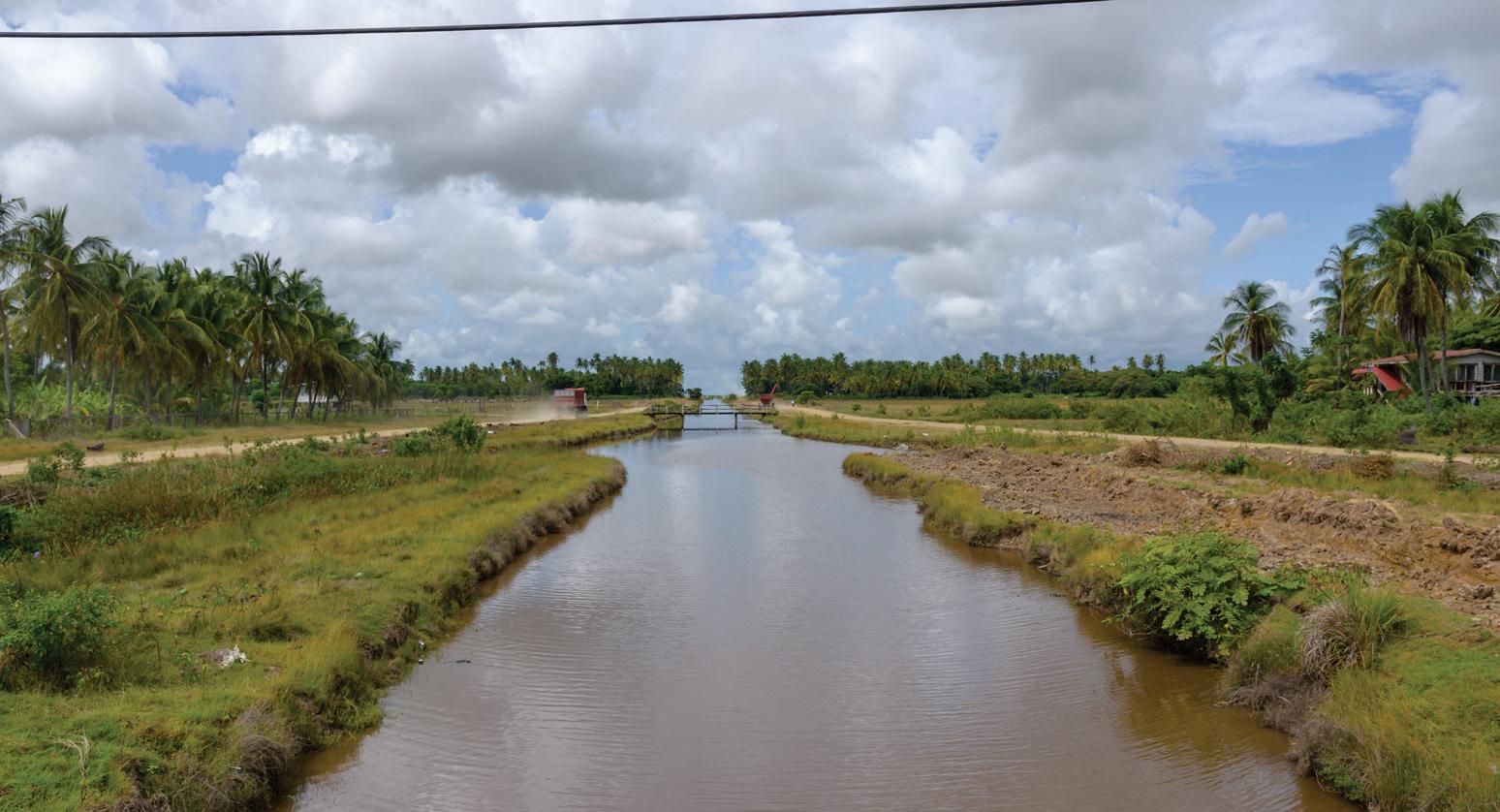

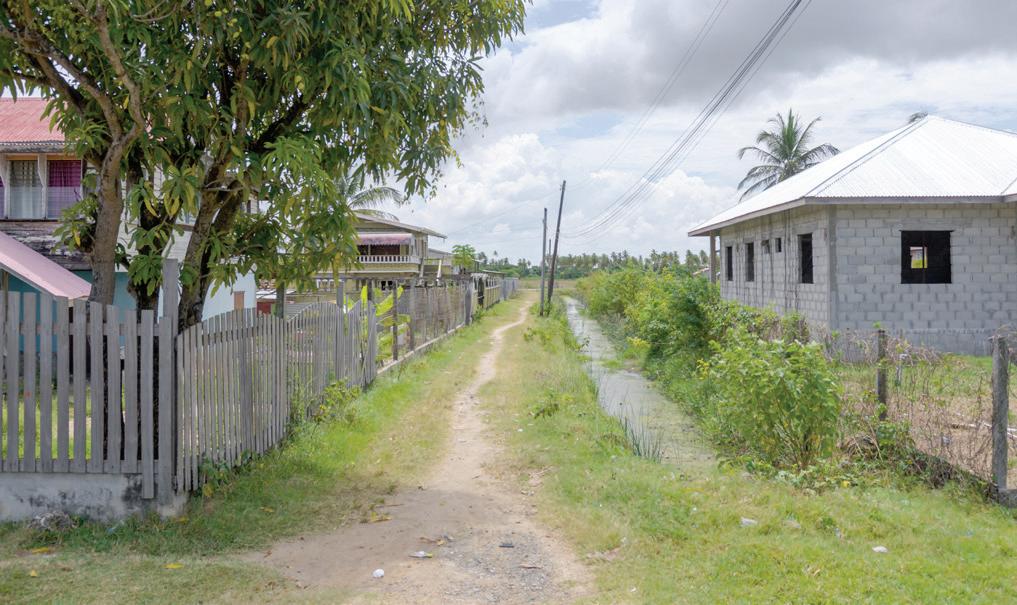
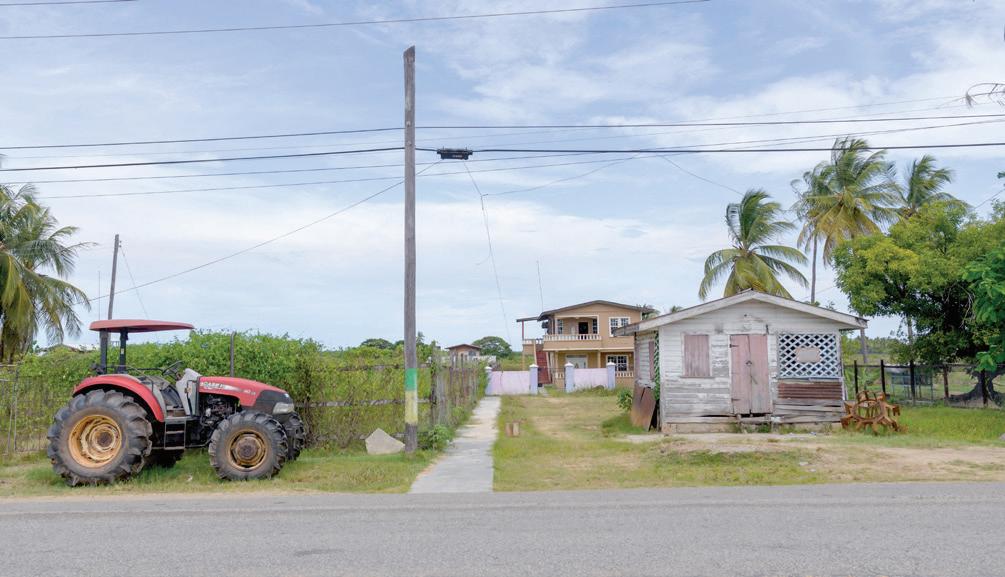
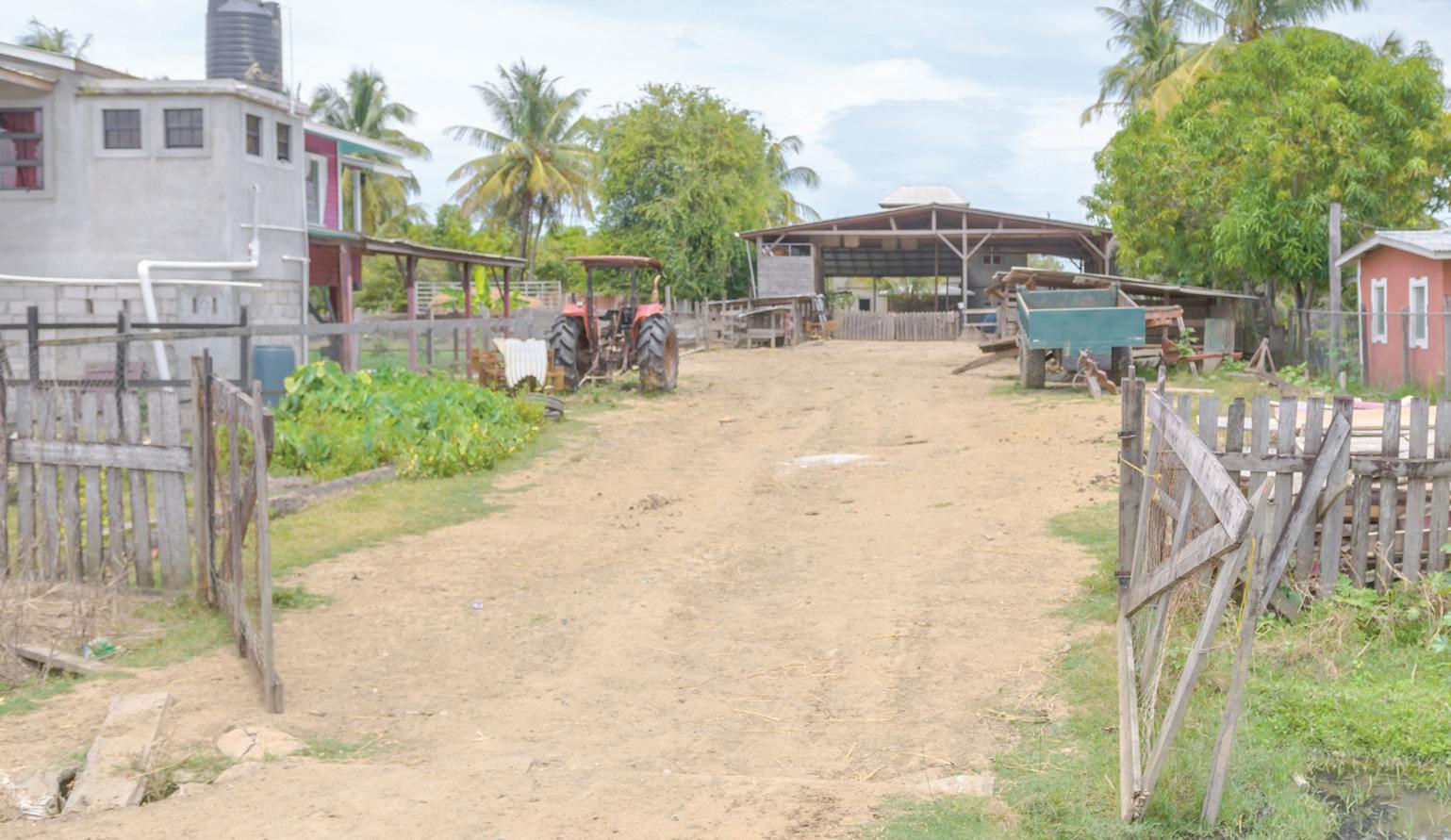

Locals reported that Tem pie Village was a rice and ground provision plantation and, after slavery was abol ished, it was bought by the Bourne siblings, three broth ers who hailed from Coren tyne, Berbice.
And it was some years after the lands were sold to individuals and most of the people that reside in Tempie Village are descendants of the Bourne brothers.
The village consists of persons of African and Indian descent and Portuguese, all of whom are very industrious.

Some of the elders have passed away, but a few are still living in the community and the young generation has jobs while the mature popula
tion are farmers.
Tempie Village also has a boutique that sells brandname clothing and other items and it is also a bill payment outlet, a service the locals utilise to transact business without having to leave the community.
The community is closeknit and a very traditional place with like-minded people who choose to remain in their home village since it is their oasis.
The nearest hospital is at Fort Wellington and health centres and schools are locat ed in the villages nearby.
Tempie Village is the place to live if you want to enjoy a quiet yet rewarding life as a farmer.
VI CHRONICLE PEPPERPOT Sunday, October 09, 2022
The people, houses, places and things in Tempie Village, West Coast Berbice (Delano Williams photos)
A
One of the canals in Tempie Village
Living and working in Tempie Village
By Michel Outridge
OWNING your own busi ness, and providing reliable and efficient service to the community can be a very rewarding prospect. This is exactly what Chamsie Car michael was thinking when she decided it was time to open a shop.
The upbeat Carmichael opened her boutique sell ing brand-name clothing, perfumes, and shoes among other things as well as a bill payment service in 2015 as a licensed business at Public Road Tempie Village, West Coast Berbice.
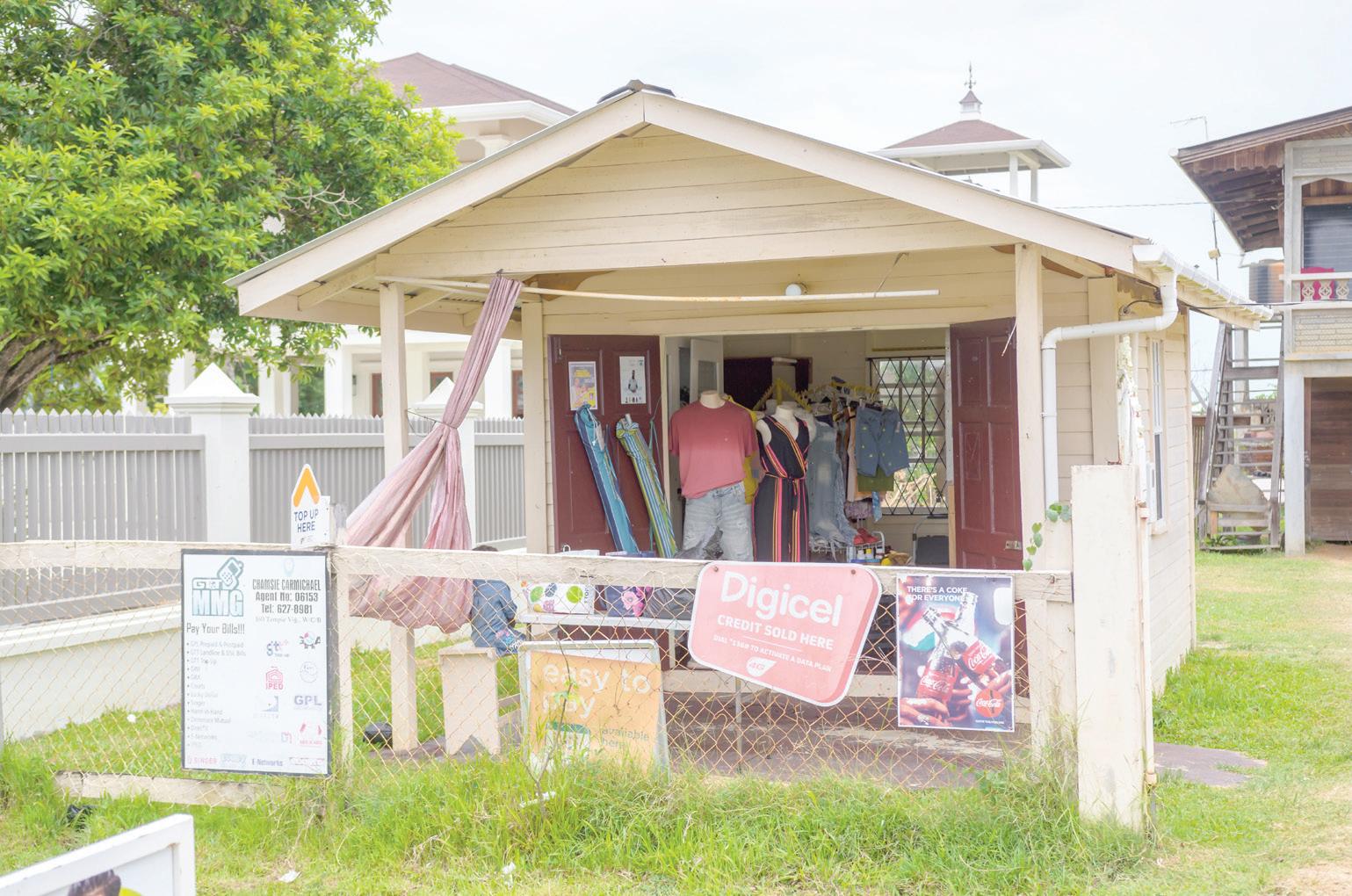
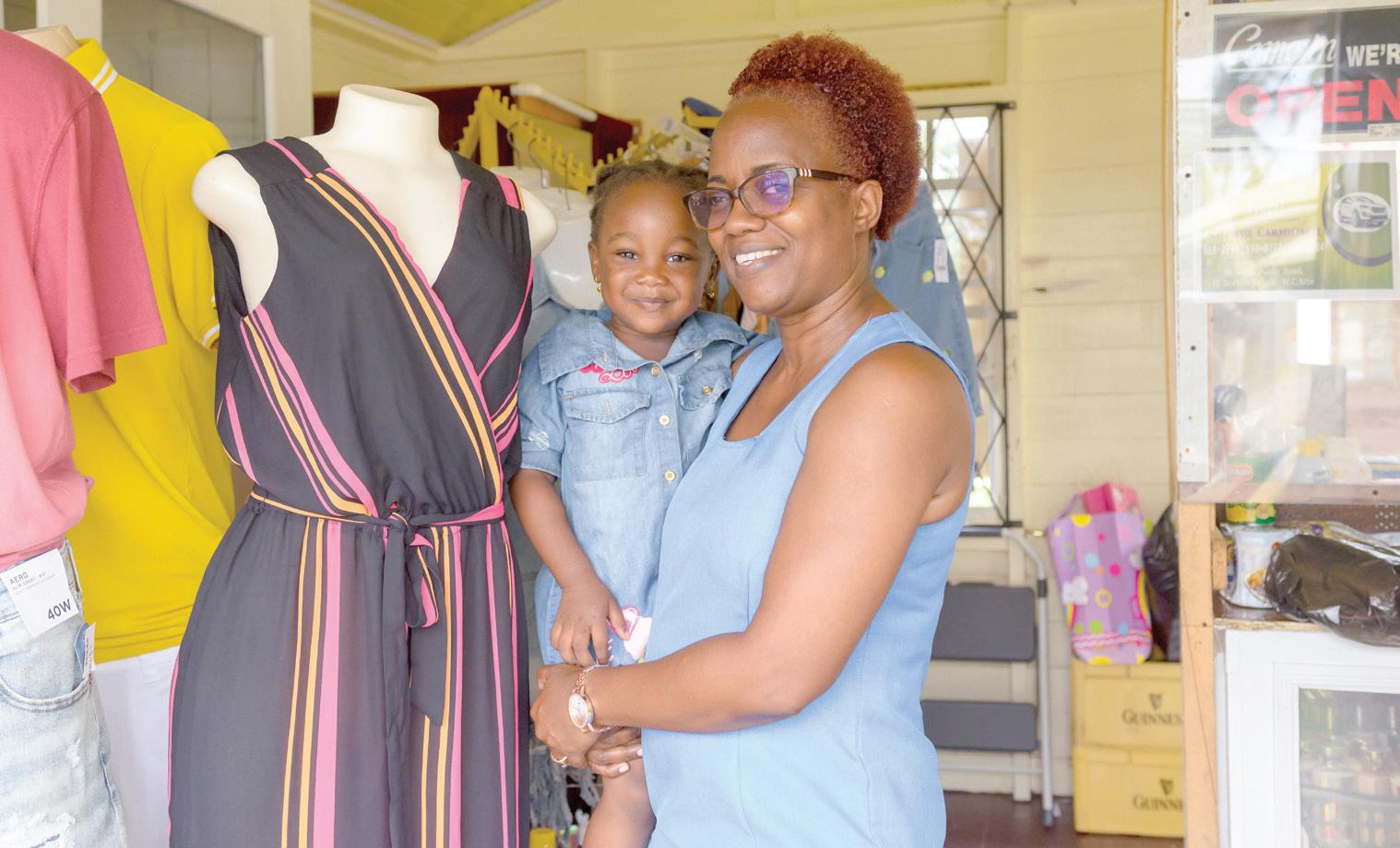
She would source all the products from overseas and before she opened her bou tique, she used to walk and sell.
The enterprising woman related that she patterned
pay all their bills at the loca tion which opens daily and even top up their cell phones.

As such, Carmichael has a good relationship with the people and they get along well. As a country girl, she knows all the people who reside there.
“This country life is nice, it simple but you must work to be comfortable and have nice things. I used to fish from the canals, bathe in the trenches and even go to the pasture to catch patwa and tilapia. Eating fresh and having our own foods is a tradition here, and the people know what they have to [do to] earn,” she said.
Carmichael explained that even though they are self-sufficient, they also need a few things to enhance their lives.
And one of those things
anniversary on Monday last.
She distributed 25 party bags, and the cake was cut and evenly shared among the school’s pupils that day following a small thanksgiv ing service.
of birth, to open his own business in 2012.
“Life isn’t that bad here but business is not like before. We are alive, and I am thankful for what I have and after living overseas, I had to come back to live here. There is simply no place like Guyana,” he said.
Franklin is a very friendly man, who spends a lot of time in his shop and tending to customers, and his fellow villagers, all of whom are known to him.
He sells clothing,
establish his own business.
These days, he takes things easy, does what he has to, and seems to be enjoying himself since Tempie Village is a safe place to reside and have a business.
Lyndon Cumberbatch, the poultry farmer
Lyndon Cumberbatch is also a Tempie Village, West Coast Berbice resident and doesn’t like the idea of having to work for people.

herself as a businesswoman after her father, who used to work in Region 10, bought and sold items as a ‘side business’ to earn.
Carmichael is a full-time employee attached to Guyana Water Inc. as a supervisor and she has her niece, Kellyann Jerricks, to manage the busi ness while she is at work.
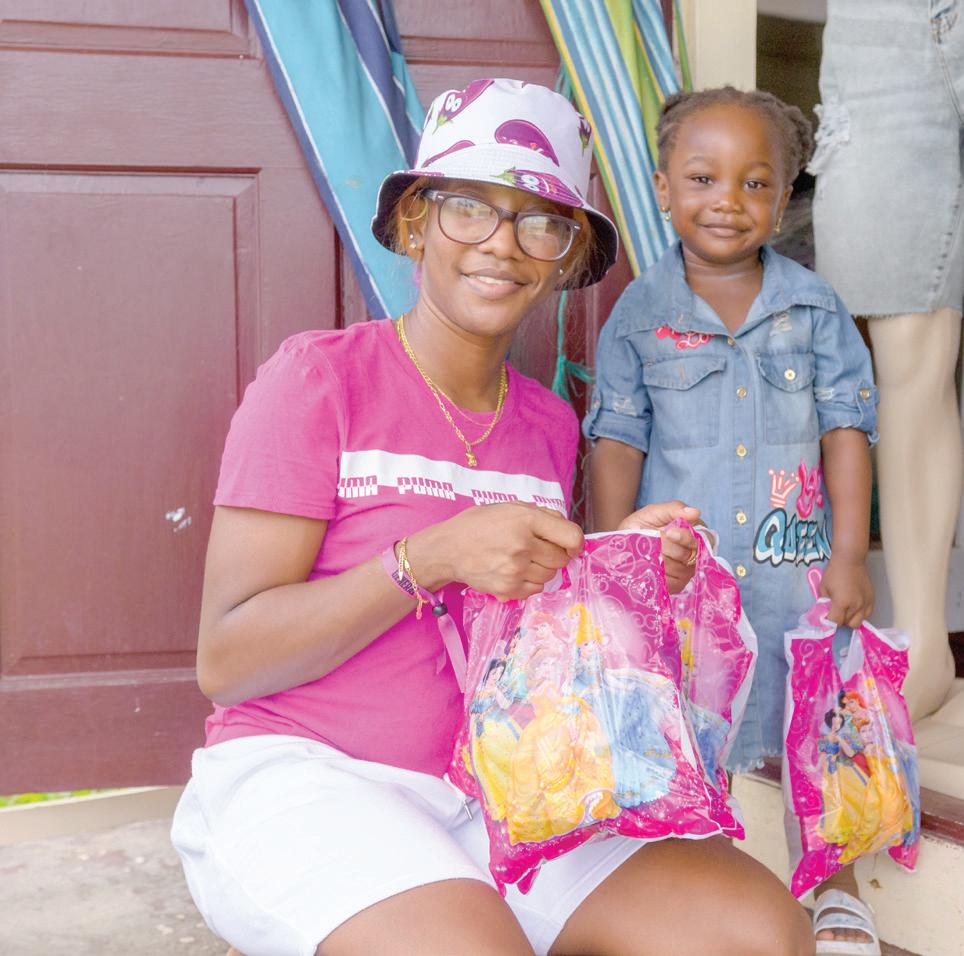
The locals of Tempie sup port the business and would
that are needed is infrastruc ture, such as an upgrade of the drainage system. Being a farming village, it is essential to have a good network to safeguard crops.
Meanwhile, Kellyann Jerricks was busy putting together party bags with goodies while she waited on the birthday cake to take to her daughter’s school in observance of her eighth birth
Frederick Franklin, the shopkeeper
Also in Tempie is the home and business place of Frederick Franklin, who has a shop with every little thing, and it is conveniently located on the public road.
Franklin worked for many years abroad and re turned to Guyana, his place
household items, groceries, beverages, feed, gas, water among other things and opens daily to provide a reliable service to the village.
Franklin is well-known and said that there is no place like home, Guyana and he went overseas to make his money and returned home to
He is rearing ducks and chickens and he would sell to wholesale buyers, who would visit to make purchases when he has poultry in stock.
Cumberbatch rears ducks and chickens on a large scale and it is his way of being self-employed.
The 32-year-old told the Pepperpot Magazine that life is nice and quiet in Tempie Village and it is a place that doesn’t make the news and nothing happens there except for a simple way of life.
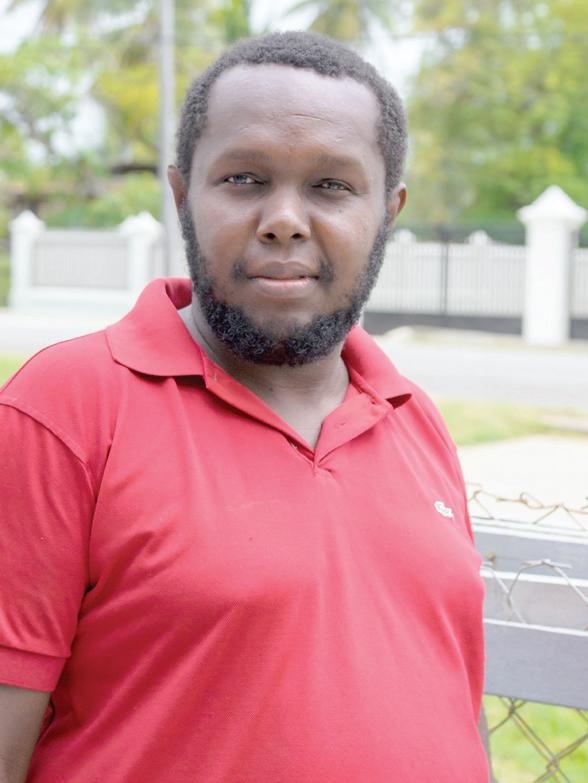
VIICHRONICLE PEPPERPOT ― Sunday, October 09, 2022
Kellyann Jerricks at the shop
Businesswoman, Chamsie Carmichael (Delano Williams photos)
Chamsie Carmichael’s shop at public road, Tempie Village
Lyndon Cumberbatch
Frederick Franklin
‘Home is where I want to be’
Tempie Village elder satisfied with life
By Michel Outridge VIOLET Lewis celebrated

her 78th birth anniversa ry on October 8. She is a resident of Tempie Village,
West Coast Berbice, who is certain that this is where she wants to be - at home - a place she has lived all her life.
The elder is a native of the village, a place she grew up and played many games as a child with her peers, some of whom have since passed away, and others re side abroad.
She told the Pepperpot Magazine that she used to live at a house across the road, her parents’ place, be fore she got her own home, which is located just off the public road.
Lewis is a very friendly person who goes out when necessary and spends most of her time indoors due to her bad knee and arthritis pains in both legs.
Walking has become dif
ficult, but she would put on a brave face and get out to go to the market or to get groceries.
The mother of five re ported that three of her chil dren live abroad and two are in Guyana and would constantly check up on her.
From the five children, she has seven grandchildren. Her husband passed away seven years ago.
Reminiscing on the past, Lewis told the Pepperpot Magazine that she grew up rough, and was tasked with most of the chores. Being the eldest, she provided support to her mother, a housewife, who took care of a step daughter as her own.
She described her mother as an extraordinary woman of worth who worked hard and cared for the home and 10 children.
Lewis reported that she used to have to fetch water from a far distance to their house, look for firewood for cooking and do the house work.
She added that things were hard back then, but life was good. These days she no longer cooks on a fireside but has a gas stove making things easier.
Lewis related that it is a modern time now and life is somewhat better, but the
olden days, they did not have a lot of stress because their life was spent meaningfully doing work and chores.

She explained that her grandfather was Alfred Sutherland and his two broth ers were the first settlers of Tempie Village. They pooled their money and bought the village which was divided into three sections.
“I didn’t have the insight then to ask my parents the names of my grandfather’s brothers, so I do not know, but I was told the story of how they bought the land,” she said.
She added that Planta tion Tempie was a rice and ground provision farm, and, as a little girl, she had a lot of fun with her friends playing in the back dam.
Lewis stated that most of her siblings reside overseas but some have since returned to build houses in the village and others expressed their desire to return to Guyana to live.

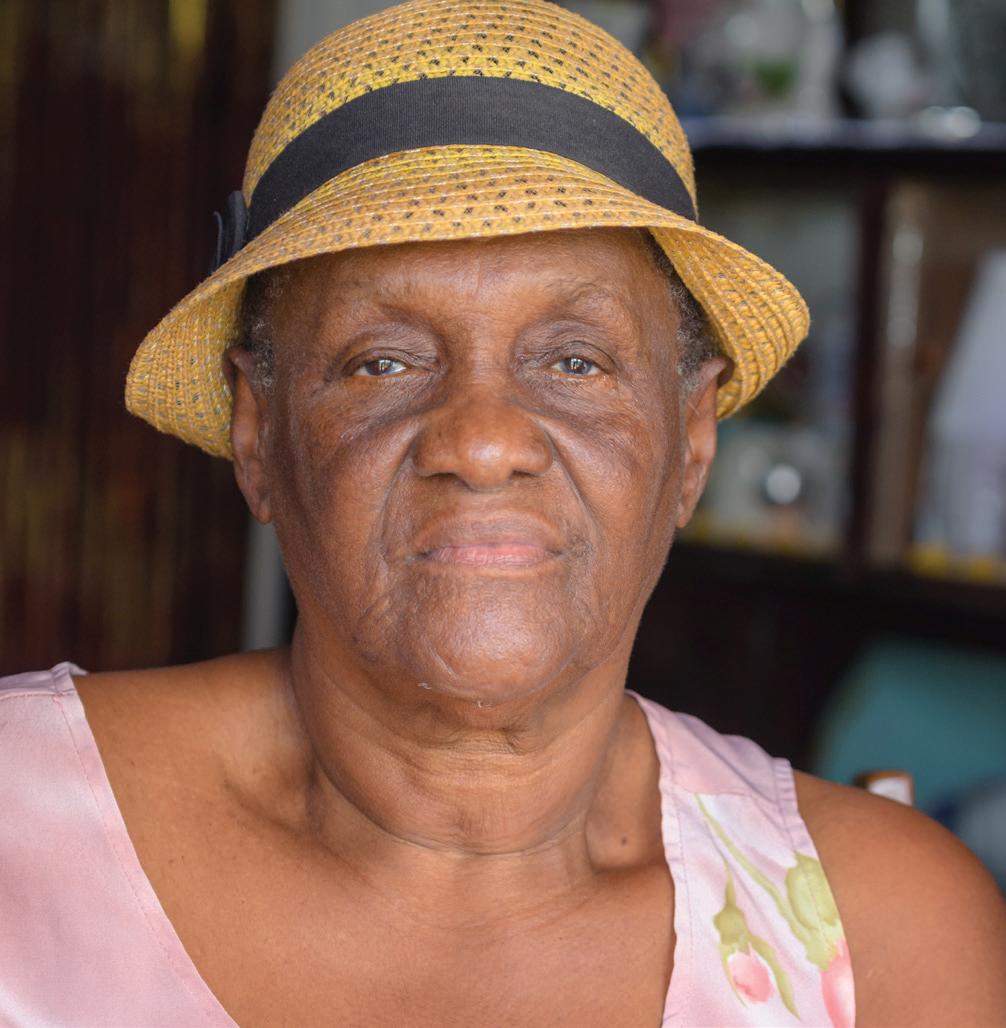
She noted that Tempie is a quiet place and she does be at home mostly cooking and doing things around the house to pass the time and she is satisfied with that.
Lewis reported that a rel ative would stay at night with her and she has a housekeep er who would visit during the day so she is never alone.
She disclosed that she went abroad for eight years to live but wanted to return home and she is comfortable here, at her home.
Lewis also lived in Kwakwani but left there in 1973. She came from a fam ily of farmers. Her parents were, and she had a simple yet fulfilling life growing up.
Henry Bourne, the elder
Henry Bourne is a res ident of Tempie Village, a descendant of the Bourne brothers, who were the first settlers of the village.
The 82-year-old told the Pepperpot Magazine that he would spend his time gar dening and he plants his own vegetables.

He added that almost everybody in the community is related by blood and it is a very nice place to live.
Bourne prefers the qui etness and tranquil lifestyle the place offers and he is at peace.
He stated that at times he would go out the village for drinks with friends and described life as fair in the roadside village of Tempie.
VIII CHRONICLE PEPPERPOT Sunday, October 09, 2022
Violet Lewis (Delano Williams photos)
Henry Bourne in his garden
Part of Henry Bourne’s garden
No such thing as a man’s job, women can do it too
- Says Tempie Villager
By Michel Outridge
BACK in her younger days when she had good health and strength, Hanawati Angus of Tempie Village, West Coast Berbice, was one of the top-class me chanics alongside her male counterparts.
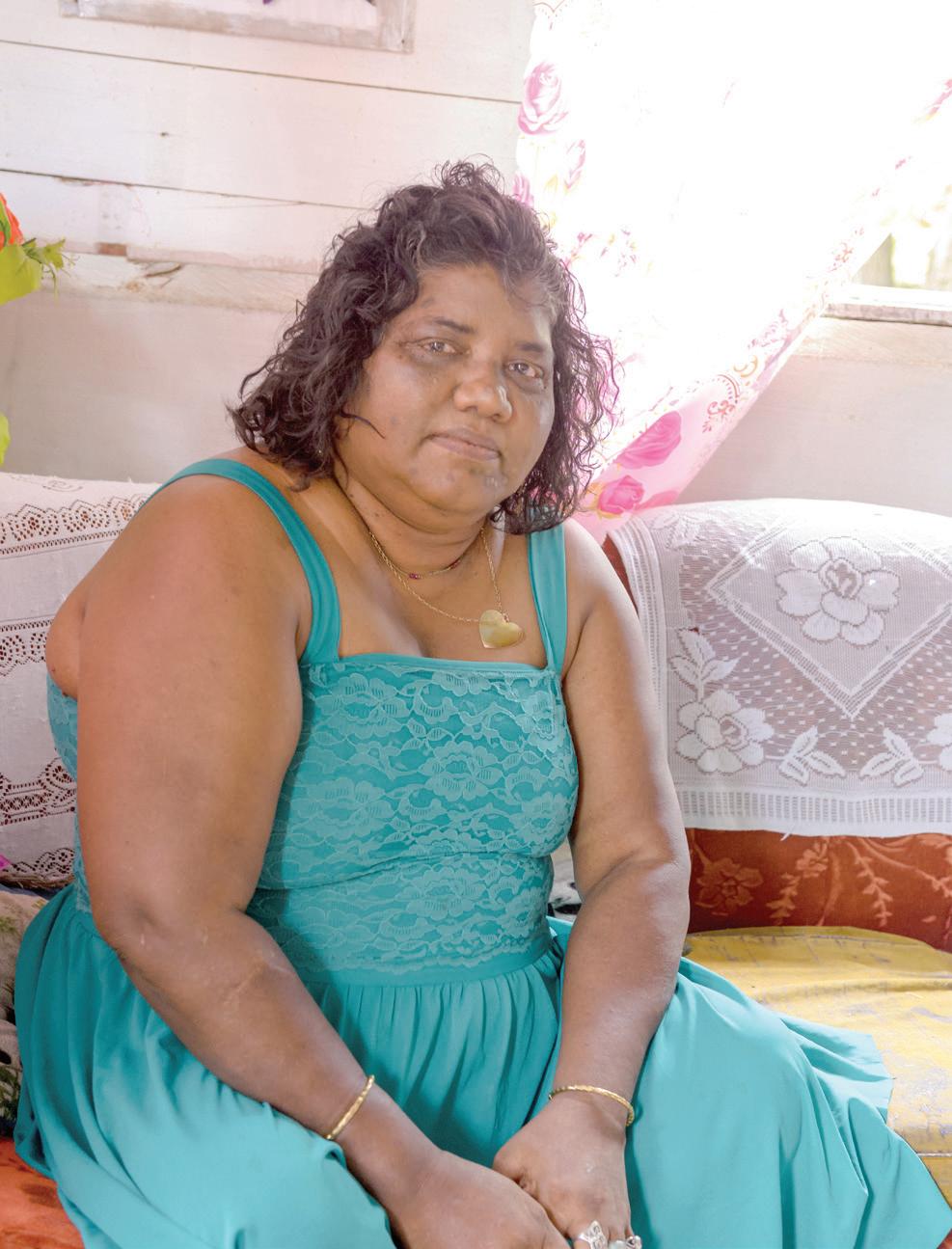
ADA) Mechanic Workshop at #27 Village, West Coast Berbice, which is no longer in operation and was re trenched 10 years ago.
“I was a guard and after the security boss and me was not on terms, I went over as a cleaner to the workshop department. There, I began to
society to earn where they feel comfortable and in any field they wish to pursue,” she said.
With her skill set, Angus was well-respected among the male population in the workshop and treated equally and really enjoyed that part of her life where her special ity was in demand.
Angus reported that she used to work at GUYSUCO for a year before she went to work at MMA/ADA and was residing at Bath Village.

The family had a shop, but due to her ill health, they had to close the small business because her chil dren, Elroy and Odellie, having formally completed the school system as top students from President’s College, decided to pursue their careers.
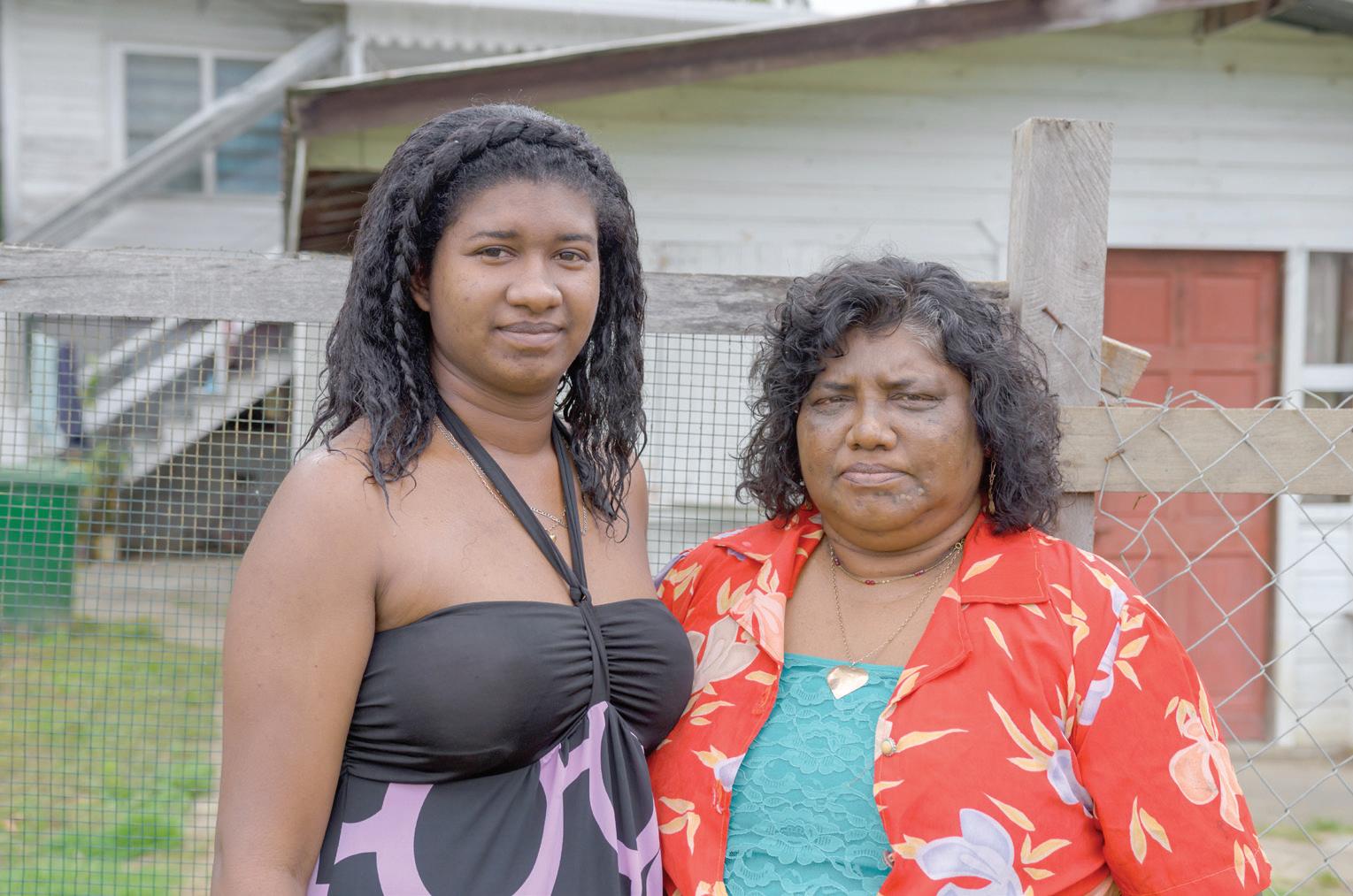
Angus enjoys a quiet kind of country life these days and she is unemployed and is mostly at home recu perating with her family by her side.
Odellie Angus, the frontline worker
Odellie Angus is a nurse at the Fort Wellington Hos pital while her son, Elroy Angus is a pharmacist at the same hospital.
neighbour told me that they wanted nurses and I applied just in time and was accepted and then my career as a nurse started,” she said.
So far, Odellie told the Pepperpot Magazine that she is enjoying her job and
at first she had some issues like the sight of blood made her uneasy, but now she has grown accustomed to working in that environment where trauma and bleeding patients would be admitted.
“Everybody around
here do something to earn and the people live close ly but most of the young people go out the village for work and the rest of the population are either farmers or self-employed,” Odellie said.
Today, she is not in good health, still recovering from two recent surgeries for her heart ailment compounded by diabetes and hyperten sion.
The 63-year-old told the Pepperpot Magazine that she is perhaps the only wom an employed as a security guard. After she took a liking to fixing engines in the work shop section, she became one of the best mechanics for heavy-duty vehicles.
The mother of five add ed that she spent 25 years at the Mahaica Mahaicony Abary-Agricultural Devel opment Authority (MMA/
take an interest in the opera tions and quickly learned to drive and fix engines of Land Rovers,” Angus said.
She related that she also switched to the heavy-duty equipment section of the workshop after she mastered the art of fixing combines, tractors, and bulldozers, be ing the professional for fix ing the injector and belt.
“Once you know about engines, you can fix it and it is also about your mindset and how you apply your skills. Anything is possible and there is no such thing as a man’s job or not. Wom en must take their place in
Odellie told the Pepper pot Magazine that when she was in high school, she had no idea what she wanted to do for a job.
But when they had a ca reer day and the people from Texila University visited the school and she learned about nursing, it piqued her interest and she qualified herself as a science student. It wasn’t difficult to apply herself.

After four years at the Georgetown School of Nurs ing, she became a registered nurse and first worked at the New Amsterdam Hospital.
“I finished school and was looking for a job and my
IXCHRONICLE PEPPERPOT ― Sunday, October 09, 2022
Hanawati Angus and her daughter, Odellie Angus (Delano Williams photos)
Hanawati Angus
A passion for farming in Tempie Village
 By Michel Outridge
By Michel Outridge
CHERYL Shepherd en visions having two shade houses in the near future.
For that to happen, she is hoping to get the grant she has applied for. In the
plants before sunrise and do the same when the sun goes down.
meantime, she is cultivat ing some traditional and non-traditional crops such as baby carrots and broc coli.
The 66-year-old told the Pepperpot Magazine that keeping herself active is a priority and as a country woman, she is no stranger to hard work.

The shade-house project is her dream and she will have one in front of the yard and the other in the backyard, which will be enclosed.
She would try to tend to her crops, flowers, and
Shepherd added that she is also rearing some layers and would sell the eggs and have some meat birds in the backyard where there are two chicken pens.
The elder stated that the villagers would support her small business by buying the chickens and eggs and whenever she has excess fruits and vegetables, she would sell or give them away to neighbours.
“In this village we are all family and we depend on each other to survive and earn despite some ‘ups and downs’ I am surrounded by relatives who live close by and that’s alright,” Shepherd said.

She related that she is
originally from #10 Village, West Coast Berbice, but her husband is a native of Tem pie Village. She has been residing there for many years so the place is home.
“I like it here because there is enough land to plant
The Tempie resident not ed that she is also a lover of all plants and flowers and it was evident by the way she displays them in her garden, which takes up her entire front yard.
Some of the plants in clude blue verine and a wide variety of herbs.
Shepherd’s goal is to expand and with the relevant support, moneywise, she will be successful since she is very familiar with farming.
Vikaue Shepherd
Meanwhile, Vikaue Shepherd is the spouse of Cheryl and he is very sup portive of his wife’s en deavours as a farmer and this couple also takes care of grandchildren during the day and still find the time to prepare a hot meal for their children in the afternoons.
The 71-year-old said that he is retired and he would spend his days assisting his wife, who is very fervent about farming.

achieving their goals.
Debra Crawford, wife of the rice farmer Debra Crawford is a
the accounting aspect of the family-owned business, rice farming, done by her hus band, Alfred Crawford, a large-scale rice farmer.
and I came from humble beginnings. My parents were farmers so it is ingrained in me, farming is my way of life,” she said.
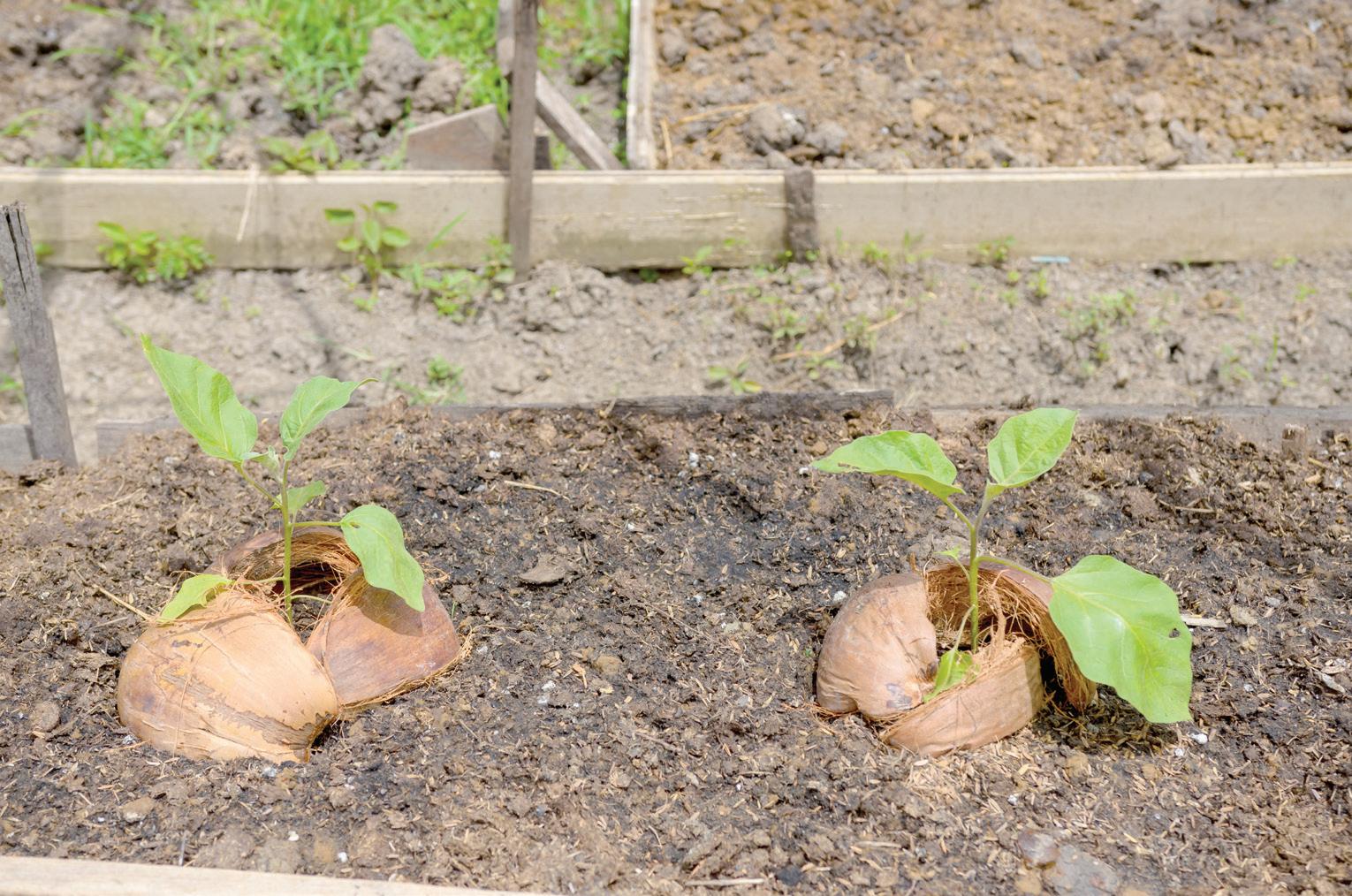
Shepherd told the Pep perpot Magazine that she is an organic farmer and doesn’t use any fertilisers and is hoping to expand in her farming of peppers, boulanger, corilla, ochro, pomegranate, five finger, papaya, cherries, pak choy, calaloo, squash, pumpkins, cabbage, celery, fine thyme, basil, tomatoes, among other vegetables and fruits.
“My wife does the plant ing and I would be there to lend support in whatever way I can and it is something to do while, I am at home,” he said.
Together, the Shepherds have six children and 11 grandchildren and they are able-bodied for their age and quite enthusiastic about
housewife and deals with
The mother of five is orig inally from Cotton Tree but relocated to Tempie Village after marriage while her hus band is a local of the village.
“I like it here, we have no close neighbours and that is just right and this is a quiet place to live,” she said.
Crawford said their rice and paddy are sold to rice millers and they provide em ployment for the men in the community.
Her sons are also part of the family business of rice cultivation and the eldest is the mechanic and he was fixing an engine for one of their vehicles when the team visited on Monday last.

X CHRONICLE PEPPERPOT Sunday, October 09, 2022
Cauliflower
and
broccoli
in the
garden
of
Cheryl Shepherd
(Delano Williams photos)
Cheryl Shepherd
Vikaue Shepherd
Cheryl Shepherd’s garden
Alfred Crawford, Jr. called Timothy, fixing an en gine at home
Home Sweet Home

AN October day in the countryside. It is warm and tranquil, the streets bor dered by modest houses in white with different colour accents with a few subtle changes to modernity.
The woman, in her thir ties, stepping out of the car unto the gravel road breathed in the fresh air as though it was a life line.
“So good to be home,” she whispered to herself, as her suitcases were unloaded, to begin a much-desired va cation, to find peace within herself and to heal after the tragedy of her husband’s death. From the metropoli tan life of skyscrapers, rush hours and the cold of North America that was home, to this place in a small tropical South America country that had been home, a real home.
“I wonder who’s still here?” she wondered.
All the family and friends she had left behind, the girls her age, for sure, would have gotten married in the rich tradition of lavish wedding celebrations.
The quiet was broken by a loud squeal.
“Eh eh, Julie girl, ah yuh dah?”
Julie turned around at the familiar voice to see who had spoken in a language she hadn’t heard in a long time.
“Oh my gosh,” she laughed, recognising one of her old friends from the neighbourhood.
“Anita, it’s you?”
“Yeah gyal and yuh come back from foreign.”
Julie hugged her old friend, tears of joy welling in her eyes, “It’s so good to see you.”
She remembered Anita as a tom-boy, who played crick et and marbles on the streets with the boys, but looking at her now, mature and married with children, Anita became a new person, her woman hood defined.
Nothing stays the same forever. Everything changes with time.
The neighbours came out to welcome her with hugs, kisses and tears. She had
been away for over two de cades and yet received such a show of affection. It touched her heart and aroused a deep sense of belonging to a place she was born, the people and its culture.
The spicy Indian curries was a delicious awakening
screaming, “Help, de man runnin’ me wid crappo!”

Aunty Galo scared of the hideous creatures, had run, screaming, through Ju lie’s mother’s yard who also ran, and it was a really fun ny scene seeing the three women running up the road
gised to appease the old man and Julie was banned from riding for a week and if that wasn’t bad enough, Marie was also handed a ban for crashing into an old lady’s gate and scaring the woman out of her wits.
Julie loved the warm mornings and cool nights, sitting on the veranda chat ting with her old friends, whilst the children played on the streets.
One night when the moon slid behind some clouds, Shanta, one of her friends, asked, “Yuh remember Dee pan, de ghost who used to walk through de streets?”
“Good Gad, chile, dah was ah real frightening time,” Demitri said.
Julie remembered Dee pan’s ghost, a white appari tion, haunting the neighbour hood for almost a week, chil dren so scared they couldn’t even peep through the cracks in the wall. It had puzzled the men, who were not scared of ghosts, until Uncle Krish, ‘The Cherry King’ decided to stake out the ghost and dis covered lo and behold, it was his own brother-in-law in disguise with a white sheet, trying to drive a scare into his wife, so she could stop nagging and bullying him. It
was a little tale that evoked much laughter, so many little episodes that created stories upon stories to tell and retell, of the days of the lives of the people in that settlement, as time moved on and memories stayed for the new generation born.
It would always be a place to love and at the end of her vacation, Julie felt reborn, a tinge of sadness in her heart that she was leaving again, but a part of her life was in the script of the stories, that will be told and retold until she came back again, because there is no place like home.
to recognise her roots; the fresh fruits and cool coconut water; the religious songs early in the morning and the chutney beats in the evening. The one thing that held her in awe was the language, the sweet rawness; a blend of Indigenous, African, English and Hindi that formed the unique Creolese language. For every day spent and for almost everyone she saw, a memory was attached, like leaves to a tree. She em braced it for it was all she had of her girlhood days that she could impart to her children.
A loud singing awakened her from a midday siesta lying in a hammock under the mango tree and she rec ognised uncle Bikarma, the old man who sang old melo dies after a few drinks.
Julie spoke to him and gave him some money and he looked at her vaguely, then he exclaimed, “Hai Ram, is Lakeram daughta, God bless yuh chile, yuh grow up suh nice.”
Julie smiled and watched him as he hobbled down the street.
His drink buddy, Uncle Willie, had passed on, a very lively character who one day had caught two ugly toads from the drain to scare his nagging wife. She had run over to Aunty Galo’s yard
screaming and Uncle Willie behind them with the toads.
The people of this set tlement were like one big family, limbs of a tree, its blossoms and fruits.

Julie cherished every moment as she retraced her steps to her girlhood days, remembering vividly her best friend who was like a sister to her and the ‘grocery shop’ they used to run with empty milk tins, soap boxes, candy wrappers and the mud and water cakes they baked for the ‘cake shops’.
They used to pick and sell English cherries on the street corner to buy sweets and pencils, and the guava trees they used to climb.
Her friend Maria had a ladies Raleigh bicycle that they rode a lot, racing around the streets on turns and Julie would never forget that day when she turned the corner so fast that she didn’t see Uncle Billie’s donkey until it was too late and knocked the animal down, but amaz ingly she didn’t fall and had hurriedly ridden away. Uncle Billie came later that after noon, fuming to complain to her father.
“Dis ah wan race track?!” he quarrelled, “Dem chilren’ dis getting too wile on dem bicycle, she knack me po’ donkey down!”
Julie’s father had apolo
XICHRONICLE PEPPERPOT ― Sunday, October 09, 2022
Connecting across borders

WHEN we programme our minds, we can adjust to uncomfortable situations. Technology was never my friend, so when we were forced into a virtual world, I had no choice but to adjust fast, and get with the programme. For the first few months, I experienced frustra tions that made me laugh at myself, and sometimes swear. LOL! After a few years, it has become so natural, as if it was always part of my life. The virtual space has created many opportunities for me, and assisted in growing my network. I met some wonderful people at various Online events, and we have done some fruitful collaborations.
One of the people I recently connected with was Oliver Fortune Chikodzore. We engaged in several discussions regarding the Africa Women in Trade Expo in South Africa later this month. I immediately detected his positive energy and his passion for what he does. I am always inspired after talking to him, because our conversations are very uplifting. He is part of the team for the ‘expo’, which is scheduled to take place from October 19-26, at Cape Town City Hall, Cape Town, South Africa. Themed: “Building Strong and sustainable Value Chain”, this event is meant to raise awareness on the importance of tailored transformational education geared to grow women and youth businesses, building participation in Intra–Africa Trade, promoting

collaborations and meaningful partnerships with global mar kets and investors, as well as support for women and Youth entrepreneurship in Africa.
Imagine wearing your first pair of shoes at age seven, and now being a successful busi nessman. When he was young, he and his mom visited a relative’s house, and they insulted them because they were poor. This is one of the incidents that made him determined to have a successful life. His journey is inspiring, and I am looking forward to meeting him.
ABOUT OLIVER
Oliver Fortune Chiko dzore is a South African en trepreneur who specialises in thought leadership and strengths-based personal de velopment. He is respected for his unique perspectives, and balance of contrarian thinking with measured judgment. He is an individual who is devot ed to the well-being of Africa, its youth and future genera tions. He has dedicated all his efforts and resources to the goal of stimulating Africa to redeem her glory, to reassert her centuries-old contribution to economies, politics, culture, and arts, and once more to be a pioneer in the many fields of human endeavour. He is an abstract thinker, yet also a concrete theorist of note. This is evident in his articles and works in various thought-leader platforms, where he has held presentations and lectures through Project Management South Africa (PMSA) and Cape Media Corporation, just to name two.
Currently, he is the Chief Executive Officer of The African Innovation and Entrepreneur ship Centre, an initiative that helps uplift the youth in struggling communities, and mobilise the future of African development and economic growth.

A fervid entrepreneur at heart, Oliver speaks professionally on leadership, innovation, change and creating a high-performance culture. Oliver believes the blueprint to building a successful business lies in getting four key pillars right: The quality of its leadership; its abil ity to innovate strategically and creatively; its proficiency at managing change intelligently; and, lastly, the degree to which it can embed a high-performance culture in people, especially in identifying critical aspects in high-pressure situations. He is extremely passionate about instilling leaders with the necessary skills to build empires, and achieve greatness within a highly competitive market.
He also answered a few questions, which gave us more insight into his amazing journey.
1. What have you found most challenging as a CEO or Executive of a large enterprise?
It is how to put systems in place for your business as well as Optimism and Adaptability, especially during and post-COVID-19 pandemic.
2. How did you become a CEO or Executive of a large enterprise? Can you please briefly tell the story?
It was through knowing myself, who I want to be, and the right attitude, hard work, dedication and the right social networks.
3. How do you structure your work days from waking up to going to sleep?

By doing my weekly to-do list and proper planning.
4. What’s the most recent significant leadership lesson you’ve learned?
Critical thinking, collaboration, the emotional glue of influence (empathy), optimism and adaptability.
XII CHRONICLE PEPPERPOT Sunday, October 09, 2022 SEE PAGE XVII
First Amerindian heritage
‘wash down’ pulled off by local businesses

TWO booming local businesses on the West Coast Demer ara often join forces in a bid to promote the indigenous life and culture. The latest effort was the first Amerindian Heritage ‘wash down’ at Dada’s Grill Restaurant and Bar.
Dada’s Grill and Calvin’s Indigenous Cuisine, at Tuschen, East Bank Essequibo, are owned by two good friends Calvin Roberts and Ken Rampersaud, who have decided to work in a collaborative effort to promote the Indigenous culture and way of life, especially during the heritage celebrations.

The event saw persons coming from as far as Georgetown to indulge in indigenous delicacies and beverages. “It was an eventful day with Indigenous vendors exhibiting their prod ucts,” Roberts shared with Pepperpot Magazine.
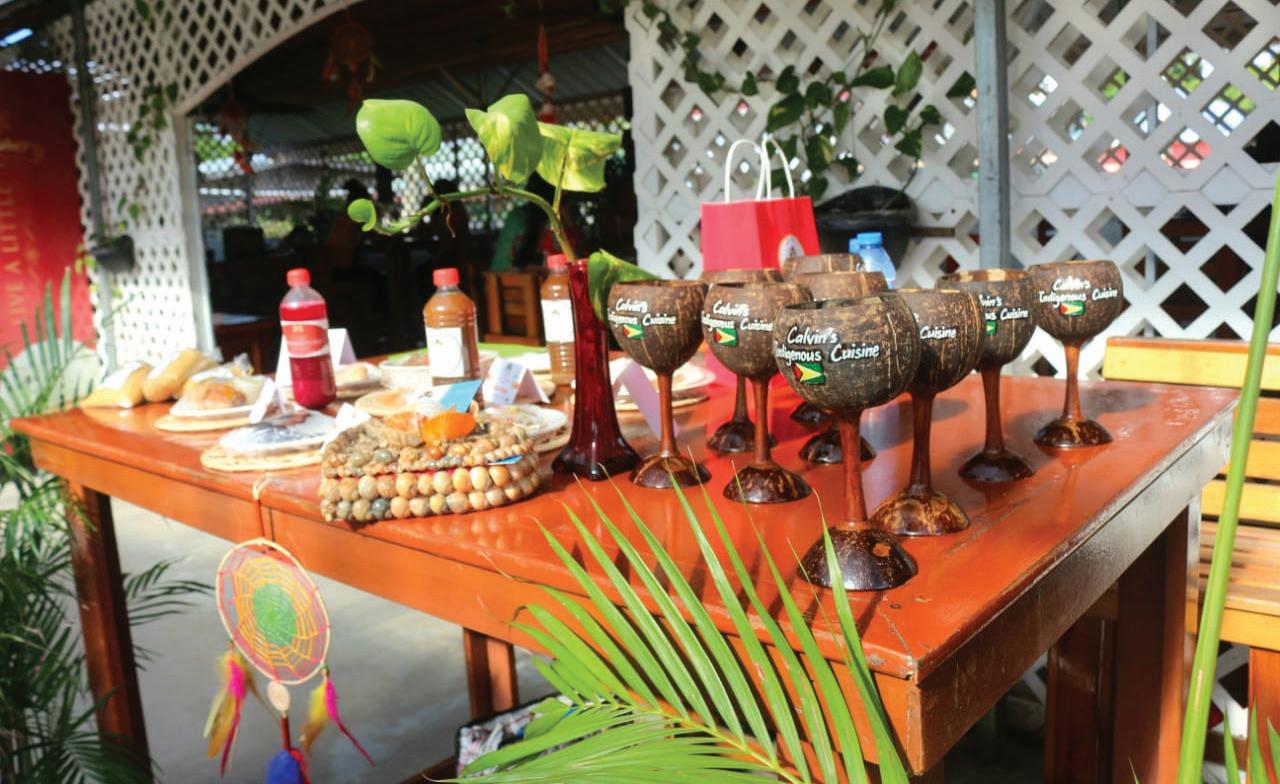
Indigenous crafter Natasha David was on hand, along with Dixies Crème Liqueur promoting the locally-made beverage. Even the Ministry of Amerindian staff was present as well. Roberts, who is also a youth ambassador for Indigenous Peoples and their rights in Guyana, had always had his heart set on becoming an indigenous entrepreneur, especially as he visited various Amerindian celebrations and exhibitions in Guyana and even overseas.
Finally, he decided what he wanted to do: Cook. “It has been something that has been lacking in Region Three,” Robert said. “As a matter of fact, I don’t think there is any Indigenous cuisine in the region, so I wanted to be the first person to do it.”
adding: “My cuisine seeks to promote healthy eating habits as we gear the Guyanese people to make a conscious decision to adapt a healthy lifestyle and thus increase the chance of their longevity.”
Roberts said he’s always advocated for the Indigenous peoples and their rights to equality in Guyana. “We are ed ucated, we are intelligent, and we are a peaceful people. We have potential and ambitions like any other ethnic group.”
Roberts, with roots in the Pomeroon, launched ‘Calvin’s Indigenous Cuisine’ – Han-the Wako-tha-the (Come let’s eat), and uses his kitchen at home to prepare all sorts of Indigenous delicacies. While he mainly works on orders, his long-term plan includes finding a space to offer dine-in. In the mean time, though, his friend, Ken, has kindly allowed him to use his restaurant to showcase and sell his delicacies.
His menu includes cassava bread and tuma pot, labba, deer, wild hog, capybara, fish, walrus and chicken, with beverages like potato wine (Fly) and piwari.

“I always wanted to start my business at home to embrace that unique ness and pride that comes along. As my business progresses, I will then venture to where ever the need is great. It is about promoting and upholding the Indigenous lifestyle, culture and tradition,” Roberts had said in a previous inter view with this publication.
As a health advocate, he also said he has witnessed how many people suffered and died from diseases such as diabetes, cardiovascular diseases, cancer, etc. “I strongly believe one of the most contributing factors for this is poor or unhealthy eat ing habits. I want to reintroduce or reinforce the importance of lifestyle modification, specifically diet modification,” he said,
XIIICHRONICLE PEPPERPOT ― Sunday, October 09, 2022
Calvin Roberts (right) and Ken Rampersaud
Calvin’s Indigenous Cuisine at Dada’s Grill
Photos:
“The Mighty Fly”
More psychosocial support in schools
ADEQUATE psychosocial support, in general, is a challenge locally despite continuous gains made. In schools, where children have all sorts of experi ences and challenges that impact their ability to learn and develop, there is an even greater need for this type of support.
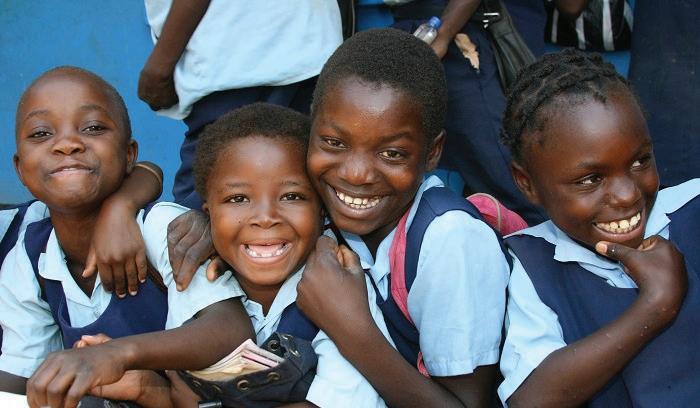
What, unfortunately, reminded us of the crucial need for this support was the death of a student at the St. Joseph’s High School in George town last week. The student died by suicide after he was, alleged ly, abused at the school.
An investiga tion has, of course, been launched by the Ministry of Education. A statement from the ministry also noted that psychosocial support is being provided to the fami ly, the student body, and the school staff.
These are all important things when responding to a tragedy such as this. Still, the availability of adequate support all along could have prevented that student’s death in the first place. Who knows what difference a trained pro fessional talking to a child in need might have made?
Speaking based on my own experiences, I don’t be
people who attempt suicide need help and support, not punishment.
New proposed laws could change these worrying facts, allowing for a greater focus on suicide prevention and mental health support. As I noted before, I think our legislation must be revamped, because it provides the necessary archi tecture to ensure that requisite support services are provided.
Targeted inter ventions must be facilitated by appropriate leg islation.
lieve that enough attention is placed on children’s psycho social well-being and welfare in schools. It is an institution al, not political, issue. Just as in the wider health sector, there aren’t enough trained professionals, and the existing personnel have a tall task of responding to the needs of large groups of people (in this case, children).
Without attempting to determine what might have contributed to the student’s death, I believe it is fair to submit that more psychoso cial support in schools can prevent these tragedies from occurring. Let’s remember that, as had become very apparent during COVID-19, schools are a haven; a place of refuge for many children. And the education system must respond to the needs of children, and not just advance their academic potential.
Because this incident in volves death by suicide, there are other things to consider. Based on existing laws, sui cide is a criminal offence, and mental health concerns are not afforded much sensitivity.


The existing law labels attempted suicide a “misde meanour”, and the individual who attempts suicide is liable to two years in prison. Many agree that such punitive mea sures have no place in mod ern societies, when there is a greater understanding that
This inci dent at the St. Joseph’s High School isn’t the only heartbreak ing occurrence in schools recently.
A few weeks ago, a fifthform student at the St. John’s High School in Georgetown took to social media to com plain about the alleged abuse from peers and a teacher. The student detailed facing this abuse because he is part of the Lesbian, Gay, Bisex ual, Transgender and Queer (LGBTQ+) community.
There again, an investi gation has been launched, and the authorities say that support is being provided to the affected students and peers involved. And, there again, adequate support in the school could prevent that student from being abused and even prevent the abusers from engaging in any harmful behaviour.
I don’t envy those respon sible for Guyana’s education and health sectors; they are both critical sectors with big needs and, perhaps, it is easy to call for more support and improved services from the outside looking in. Still, abuse of students and an unfortunate death by suicide cannot be overlooked and forgotten. Such solutions must be sought after with much alacrity.
If you would like to dis cuss this column or any of my previous writings, please feel free to contact me via email: vish14ragobeer@ gmail.com

XIV CHRONICLE PEPPERPOT Sunday, October 09, 2022
THE ROAD TO HELL IS ALSO A TREACHEROUS PATH OF PROMISES AND INSINCERITY
Not because you live in a yard, you understand all the herbs, botanicals, and insects that dwell there in. Sometimes sounds and scents you term innocent are potent to situations that if you knew, you might have been able to save a life or two, if they would have listened and heeded the advice not to touch or taste, inhale or hold sacred, out of curiosity or temptation. To do a most recent article, it took me into the audience of the Main Street Gallery. There were colleagues I
that I was sure passed as a result of AIDS, because, from the ‘80s to the ‘90s, the two plagues that descended on Guyana were AIDS and Co caine. The conversation with these fellow artists drifted into the bizarre, with what they related in respect to the three discussed colleagues of ours, whose exceptional con tributions I had brought up. These three artists in partic ular had raised and directed a strange line of questioning back then, which, when end ed, was still unclear to me what they wanted me to re
The heated conversations with the two passed col leagues had occurred around 2002. I had just published the first of a two-part Folklore Comic book named ‘Leg end of the Silk Cotton Tree’ (never got to publish the conclusion issue). These two artists wanted to know how I had developed the spirit bound in the tree and the concept as a whole. I argued that I had digested childhood family stories. We had spo ken for a while about means of penetrating transcendent inspiration and other related


a drum section in the small pasture in conjunction with the Range, and he began dancing, with unusual body movements.
Yes, there are things we aren’t sure of, nor have ex planations for, with too little information on what, how, and the in-depth nature of such processes. Like what controls what, and the con sequences of, and I have some witness experiences that have registered caution of the three percent that may have undefined clarifications, like what in a Drum Beat can entrance someone. This is similar to what happened to a Department of Culture dancer decades ago, on a visit to Latin America, who was enveloped by Mexican Drummers, who was en tranced by the rhythms, but
was skillfully normalised by the very drummers.
However, the thing about my artist buddies that I’m referring to revolves around an experiment that a patron is said to have done in host ing them towards encour aging higher expression of their skills. The artists were encouraged in isolation, to use narcotics towards arous ing a creative aphrodisi ac-out-of-world visionary experience. I believe, that It’s impossible to achieve this. Creativity cannot be spiked by substances. Inspi ration comes from environ ment and an inner ability to interpret symbolisms and expressions that others may not observe. True, there may be something else at work, with creative souls in diverse fields; but it is attached to
these individuals, and it isn’t narcotics.
This reminded me of the talented Haitian Art ist Jean-Michel Basquiat, who is said to have been encouraged to use narcotics to expand his creativity. He died in his Art Studio at the age of 27, 1988, an age that mysteriously links him to too many talents in the USA who have passed at that age; from an overdose of Heroin, a movie was made with a top-level cast, a movie that local artists should see. In 2017 one of his paintings was auctioned for $110.5 million. I realised only a month ago, what my passed colleagues were pointing at, back in 2002, but they and the patron was misled about me , but otherwise, so I also think.
haven’t had a confidential conversation with, say, for decades, which would not be an exaggeration. The world of the ‘Arts’ is much more complicated than ap parent. We are just out of the COVID Pandemic, which I declared to the colleagues I were with to be a chemical and biological warfare imposition, much like HIV-AIDS.
I reflected on two talents
spond to. Even though I had tried to get to the core of their indirect questionings back then, that had led to heated arguments, especially with two of my colleagues who have passed since that time.
The still living member of the three, my current colleagues assured me, was now strug gling with what the morbid topic of this shaded, sad, and disturbing conversation was all about.
out-of-the-ordinary stuff. I assured them that though I didn’t dispute the boasts and writings of sages, occultists, and pulp fiction mystics, I wouldn’t be the candidate for an experiment of that kind of uncharted uncertainty; towards finding out whether it constituted reality or was just harmless beliefs. Be cause I had once stood next to a neighbour on the Range in West Ruimveldt during

XVCHRONICLE PEPPERPOT ― Sunday, October 09, 2022
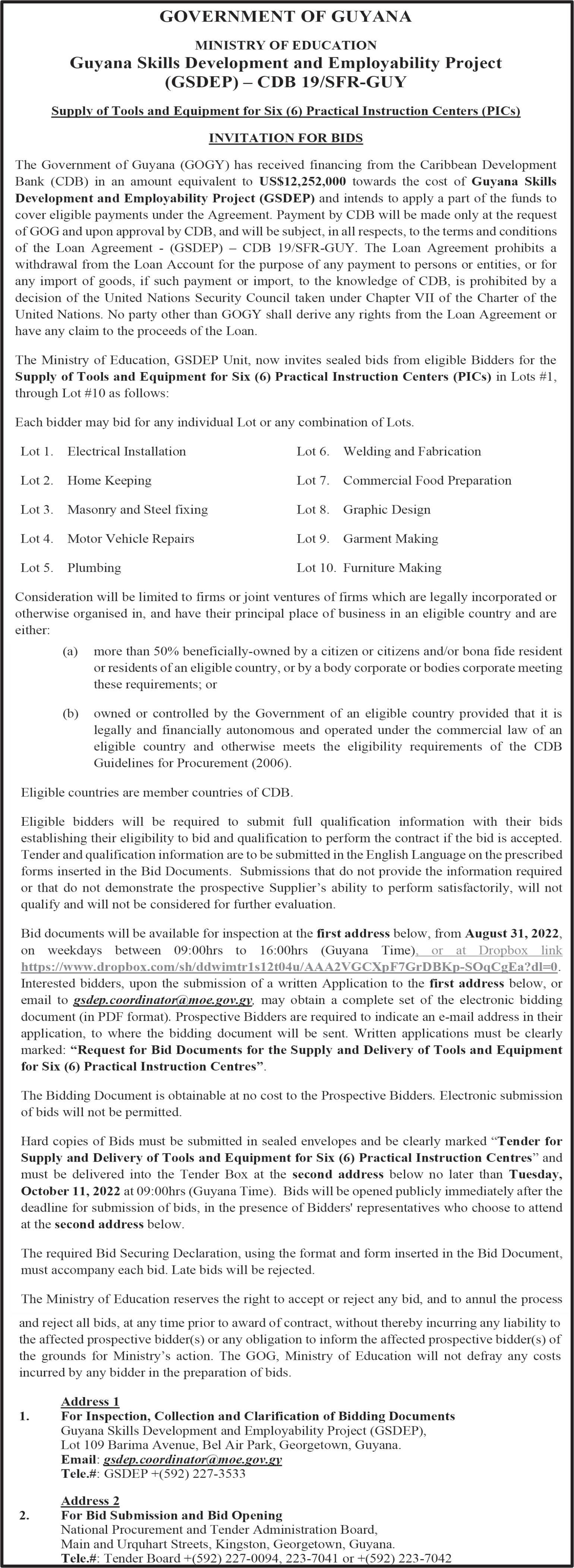


XVI CHRONICLE PEPPERPOT Sunday, October 09, 2022
Connecting across ...
FROM PAGE XII
5. What’s one book that has had a profound impact on your leadership so far?
Can you please briefly tell the story of how that book impacted your leadership?
The Seven Habits of Highly Effective People by Stephen Covey. The book has everything you need to know about emotional intelligence, attitude and strategy. “Strategy is not just about how you want to achieve in your business. You need to have a personal plan to shape your whole future. Have you done a SWOT analysis and used scenario planning to craft your journey of where you want to be in five years, 10 years, a lifetime? Seeing possibilities is a choice and making them happen is a passion.”
6. How do you build leadership capacity in a large enterprise?
By empowering others to realise their potential.
Oliver’s success story reminds us that it is possible to overcome and succeed when we need to help oth ers. Our ability to dream and imagine is so powerful. I encourage us to permit ourselves to imagine the life we desire to live. Albert Einstein said, “Your imagi nation is a preview of life’s coming attractions.”
That reminds me of the coming attractions we see at the movies.
What are the coming attractions showing on your mental screen in the mind as we continue to cel ebrate this beautiful jour ney called life BEYOND THE RUNWAY.
Boost to local ...
FROM PAGE II
persons direction on what they need to do to get to the next level. “Once you have one pay ing market outside of Guyana, you can potentially be making money for the rest of your life,” Telford pointed out.
He plans to involve other overseas-based Guyanese in the music industry to help with the education process and create a pathway for local artistes. “To see people in Guyana making it to a superstar level and giving them motivational informa tion; to have these young kids understand that there is a way for them to move forward; they don’t have a ceiling in terms of their career,” Telford said.
The company will be look ing to train local persons to become specialists in different aspects of the music business in Guyana so that seasoned persons will eventually be on hand to handle things here. “It expands into tourism as well because I’m going to be bring ing a lot of international friends into the country. We want to be able to attract artists, producers and writers from across the West Indies and the Caribbean,” Telford shared.
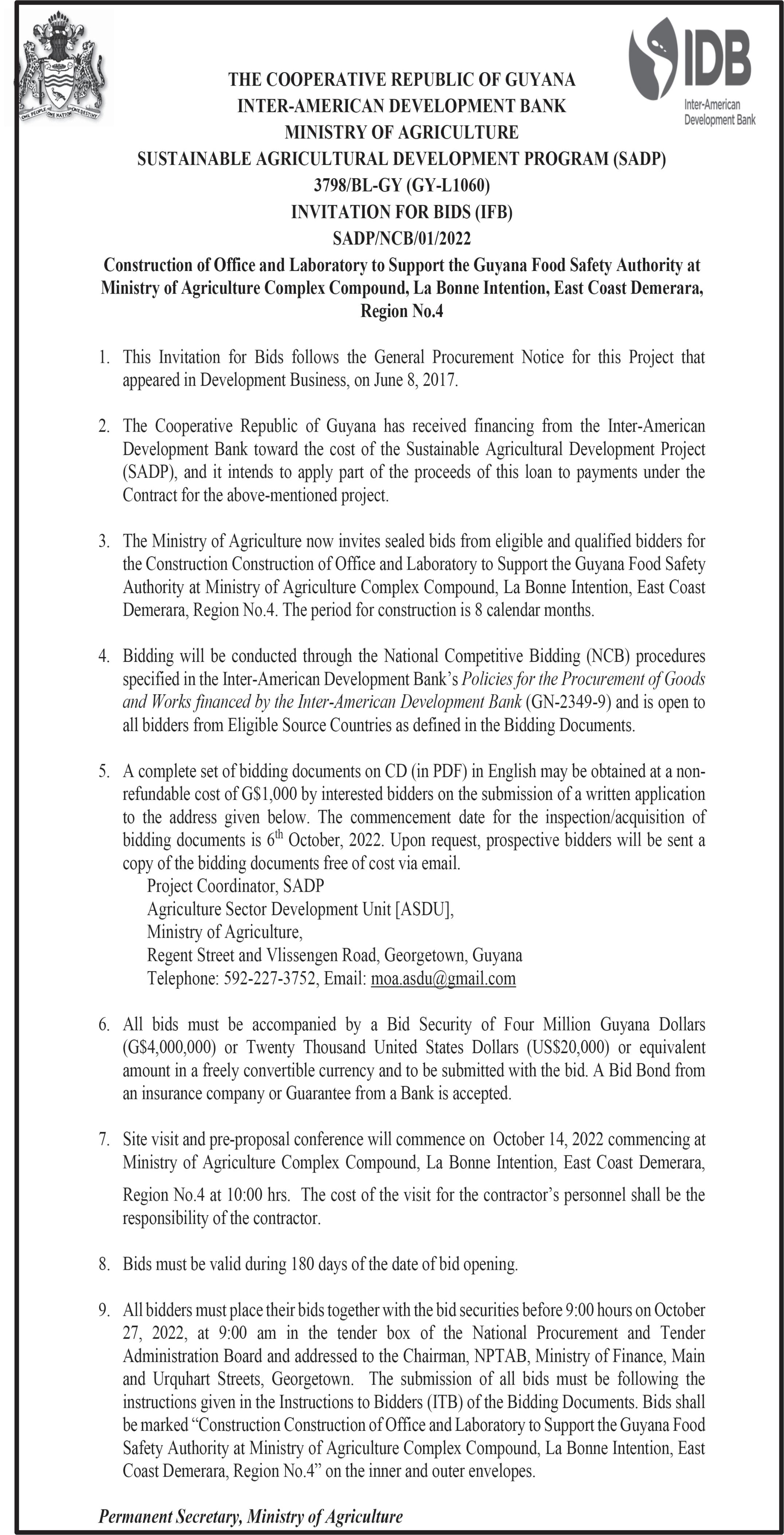
He has had various roles across the music industry since 2008, and the team has been putting emphasis on finding and procuring talent from Guyana, the Caribbean, Africa, Latin America and territories outside
of North America.
“Our mission is to go after Guyanese talent, and we do have our eyes set on a few persons, but we will have to first sit down with them,” Telford had told this pub lication in a previous in terview. At the time, his company had the capac ity to sign an artist up ward of US$5M. “With this capacity, we can go after writers, producers, artistes, from all across the world,” he noted.
Telford had played a key role in putting together Vybz Kar tel’s “Watch Over Us”, Koffee’s “Toast”, Jorja Smith’s “Be Honest”, Koffee feat Gunna’s “W” and Ludmilla’s “Verdinha”. He also worked with Kim Frank iewicz, Harri Davies, Tom Desavia, and Jere my Yohai in closing the deal to bring Walshy Fire (of Major Lazer) to Con cord Music Publishing.
Apart from find ing Guyanese singers and songwriters, Tel ford had said he was interested in creating a performing rights or ganisation in Guyana. He said because the country has no such organisation, it makes it difficult for major companies across the world to come and do business here. It also hinders local artistes from being adequately compensated for their work.
XVIICHRONICLE PEPPERPOT ― Sunday, October 09, 2022
Unfaithfulness and Mental Illness
A few weeks ago, I wrote a column on how to have a healthy divorce and got many responses requesting closely related topics. I ap preciate all of you reaching out and will always address any topics you desire. I re ceived one asking about dis cussing the mental health implications of unfaithful ness which usually leads to divorce and another on how best to co-parent. I will be addressing both.


Today, I’m going to dis cuss unfaithfulness and the effects it can have on in dividuals and their overall well-being.
A woman wrote in ex plaining that her husband was unfaithful, causing their divorce as well as the effect it is having on her. I think it’s an important topic to discuss as it is so prominent through out our society. I myself know very few relationships that are monogamous- which
means to be married to or in a sexual relationship with just one individual.
We’re going to talk about being unfaithful in general, as only married people can commit adultery and you do not have to be married to be devastated by that betrayal.
For the religious, adultery is a sin; the word itself from its Latin heritage ‘adulterare’ means to corrupt. It is one of the major causes of breakups/ divorce worldwide. How
ever, its effects on both of individuals are widespread.
Unfaithfulness/ cheating causes many complications for both the cheater and the victim, ranging from psy chological, physical, and financial stress- both short and long-term. It also affects an entire family. Even though it’s so rampant and typically ignored, cheating is usually disapproved of in society. In fact, it is still against the law in certain countries such as Saudi Arabia, North and South Korea and Pakistan.
not only the current but also for future relationships. This is called projecting when victims are more often than not afraid, insecure and un trusting in their new relation ships. This can lead to high anxiety, depression and even suicide.
Cheating will affect the children if the family is split apart. Trust issues are typ ically passed on to them, affecting their future friend ships and intimate relation ships. I know many people who have never been cheated
always be other problems to ‘blame’ the cheating on, but despite temptation, we hu mans can choose whether we hurt someone deeply or not.
The main reason always cited to me is a lack of at tention. The partner has felt ignored by their significant other, which has lowered their self-esteem and selfworth. Therefore, they seek attention elsewhere.
There are many ways one can pay attention to their spouse. Some examples are constant communication of the problem- not talking, ig noring and holding a grudge solves nothing. Other exam ples are being physically and mentally present, affection ate, compassionate, patient, empathetic and sexually ac tive. Human beings long for these types of connections. Basically, cheating is an ex ternal reaction to an internal problem. Participating in the above examples are internal solutions.
There’s no doubt that the idea of adultery/ cheating is attractive. Humans love reading about it, watching it on television, and many simply love the excitement of pleasures we can’t easily have.
But what are the serious after-effects?
For the person who has committed adultery/cheating, they may experience: - Intense guilt - Anxiety about being caught - Depression due to con sequences if/when caught - Violence as some peo ple can get physical if they find out they have been be trayed

- End of a marriage/ re lationship
- Broken relationships with children and other fam ily members
- Financial stress - Medical consequences such as acquiring a sexually transmitted disease (STD)
- Pregnancy (themselves or the outside person)
Now, what does cheating do to the victim?
It causes extreme hurt, low self-esteem and selfdoubt. It ruins the trust for
on (to their knowledge) but are terrified of it because one of their parents were unfaith ful. This prevents them from having a normal, healthy relationship which includes trust, love and respect.
A common questionWhy do people cheat?
Other than serious ill nesses such as sex addiction, there are many contradic tory reasons as to why peo ple cheat. It is known that wealthy and powerful men/ women cheat as they be lieve everything has a price. However, people who are not wealthy or those who are in stead with powerful partners cheat. Why? Because they feel as though they don’t have enough power in their relationship. Many people also blame cheating on drugs and alcohol. They have had too much. Their inhibitions are lowered, which causes normal thought processes to go haywire.
Whether you are male or female, wealthy or under privileged, black, white or brown, powerful or not, have a mental illness or not, there are people who cheat and people who don’t. It’s simply a personal choice. There will
What happens after you have found out?
Well, there’s a big deci sion to make. Do you stay and trust that it won’t hap pen again or do you end the relationship? I did not realise until recently how many people are stuck in this type of situation as they have no where else to go and no other way to financially support themselves or their children. This is where the community groups I spoke about come into play. If you have been betrayed in this manner, you are definitely not alone and can bring others together to offer support to one another.
It’s an awful feeling, betrayal, and people of ten ask me- will they do it again? I just want everyone to know, being cheated on is not your fault; someone else’s lack of respect and care for your feelings is never your fault. No one can ever know whether or not it will happen again. I just know the behaviour science behind it, once or even twice can be a mis take; three times or more is a behaviour pattern that won’t ever change.
XVIII CHRONICLE PEPPERPOT Sunday, October 09, 2022
World Food Day
THE right to access healthy food options at an affordable cost is some thing we often take for granted, given that food choices in Guyana are vast and easily accessible for most. As far back as 1945, the United Nations recognised food as not a privilege but a right. Since
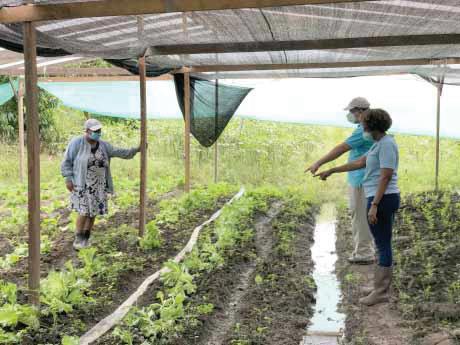

Food Day 2022 is “LEAVE NO ONE BEHIND”. Al though we have made progress towards building a better world, too many people have been left be hind; people who are un able to benefit from human development, innovation or economic growth. In fact, millions of people around
problem is access and avail ability of nutritious food, which is increasingly im peded by multiple challeng es, including the COVID-19 pandemic, conflict, climate change, inequality, rising prices, and international tensions. People around the world are suffering the dom ino effects of challenges that
is obvious and essential.
Healthy food provides us the nutrients and energy to develop, grow, be active, move, play, work, think, and learn. Foods are directly re lated to our body, and mental and social health, because each food or liquid contains particular nutrition such as carbohydrates, protein, vi tamins, minerals, fats, etc., which are essential for our physical and mental growth.
Today, most of the food energy requirement of the world’s ever-increasing pop ulation is supplied by the in
dustrial food industry, which produces food with intensive agriculture, and distributes

it through complex food processing and distribution
1979, the global commu nity has observed World Food Day on October 16 to draw attention to the plight of the hungry, and highlight the need for a healthy diet for all.

The theme of World
the world cannot afford a healthy diet, putting them at high risk of food inse curity and malnutrition. Ending hunger isn’t only about supply; enough food is produced today to feed everyone on the planet. The
know no borders. So this theme encourages people and governments worldwide to focus on solving these challenges.

THE SIGNIFICANCE
The importance of food
XIXCHRONICLE PEPPERPOT ― Sunday, October 09, 2022
SEE PAGE XXII


XX CHRONICLE PEPPERPOT Sunday, October 09, 2022


XXICHRONICLE PEPPERPOT ― Sunday, October 09, 2022
World Food
FROM PAGE XIX systems. This system has been very successful in our world, with regard to making all types of food very affordable and accessible all over the world. De spite these advancements, it is still seen that a large number of people are still hungry, demonstrating inequalities in food production and availability.

Our planet currently produces enough food to feed every person on the planet. However, it is estimated that about 1.3
billion tons of food is lost or wasted annually in our world, which makes up about 20 per cent of the total food produced in a year, and if this food is saved, then it can feed every hungry person on our world. So, this day also aims to raise awareness on the issue of food wastage.
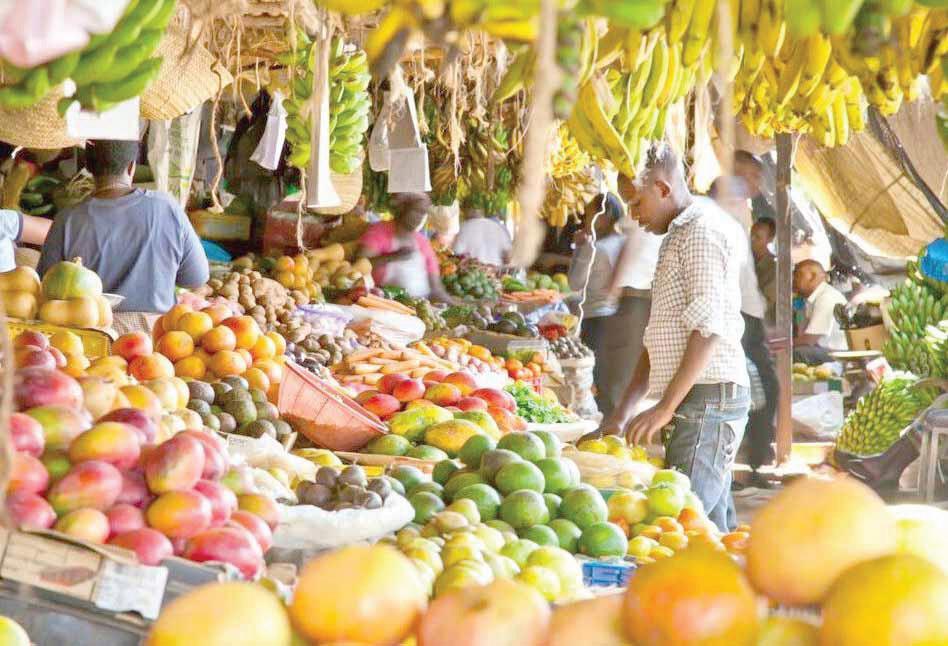
Millions of people worldwide continue to suffer from the health consequences of malnourishment, which damages growing bodies and brains. That’s why these effects their immune system, making them prone to various diseases, and also makes them physically weak, thereby reducing their productivity.
How can YOU celebrate World Food Day?
1. Choose a sustainable diet with less meat, and local ly-sourced produce
2. Avoid food waste
3. Start your own kitchen garden
4. Support local farmers
5. Volunteer in activities to eliminate hunger
You can share your ideas and questions by sending letters to: “Our Earth, Our Environment”, C/O ECEA Programme, Environmental Protection Agency, Ganges Street, Sophia, GEORGETOWN, or email us at: eit.epaguyana@gmail.com. Follow us on Facebook and Instagram and subscribe to our YouTube channel.
(Photos courtesy Guyana National Bureau of Standards, Food and Agricultural Organisatio and OilNow)

XXII CHRONICLE PEPPERPOT Sunday, October 09, 2022
...
It’s road safety, not rocket science
THE media has constantly been reporting on the many great events and activities that are currently happening in our country. In the same breath, many reports are also being made on the many road accidents caused by reckless driving. It’s one thing for a driver to lose control of his/ her vehicle and end up in a minor collision with little to no injuries—but it’s a different ballgame when so many accidents are currently occurring because of irresponsible and dangerous drivers on our roadways. I’m still a user of public transportation. Myself and many other Guyanese depend daily on public transport to get from one place to the next. Roadways on the whole, are never safe. You al ways need to be on the lookout while using it. We invested so much in beautiful roadways and highways when the majority of the drivers of our country can’t simply follow traffic regulations to commute on said roadways. It’s quite embarrassing to say the least.
To be quite honest, getting into an unknown car with an irresponsible driver is scary. Clearly, these drivers don’t even care about their own safety to drive at such a high speed or disobey almost every traffic law in the handbooks—so why then must I trust them with my own life? It’s sickening to read of the many lives that were loss recently due to speeding, drinking & driving, and reckless overtaking—just to name a few. Some days, I don’t even feel safe as a pedestrian to walk alongside the roadways because of the carelessness of drivers. There are days when I have to stand up and wait long for a generous driver to even stop or slow down at a pedestrian crossing. I’ve even witnessed drivers speeding past traffic police officers at least twice, blatantly disobeying their signals on the roadways.

I do believe that our country needs to have an active road safety en gagement pro gram with the general public. Note, the key word “ongoing”. It should not be for just a day or a week. More efforts should be made to sin gle out reckless drivers and they should be faced with the consequences of their actions as prescribed by the law, not by bribes or fa vours. I know that we cannot stop the inevi table from hap pening. How ever, I’d still like you all to remember that one simple mis take can change your life forever.
As simple as sending a, “good morning” text while driv ing, or having just a single beer before driving off can put you and others in so much danger. I’d like to remind mo torcyclists to always wear a helmet. If you’re a driver or in the front seat, be sure to wear your seatbelt. Be sure to always obey the traffic symbols as well as the speed limits for the roadways. One important road safety measure I’ve learned in recent years is that you should always observe

other road users and use your mirrors frequently. If you know you’re not a reckless driver, you ought to still look out for reckless drivers. As most of us continue to be road users every day—I hope day after day, we all can
get home safely to our families instead of being another number added to the annual statistics for road accidents and/or fatalities.

XXIIICHRONICLE PEPPERPOT ― Sunday, October 09, 2022
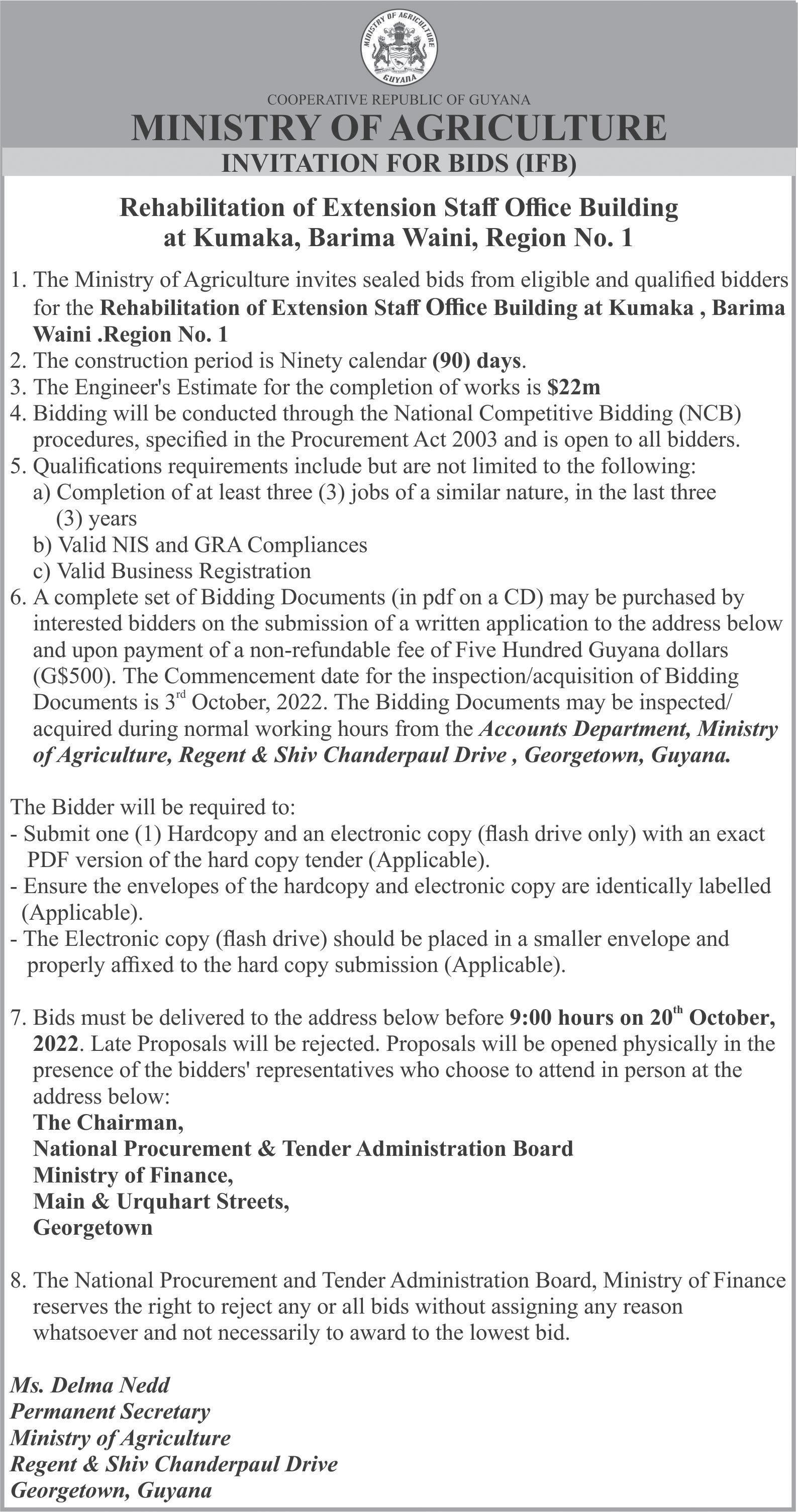



XXIV CHRONICLE PEPPERPOT Sunday, October 09, 2022




XXVCHRONICLE PEPPERPOT ― Sunday, October 09, 2022

XXVI CHRONICLE PEPPERPOT Sunday, October 09, 2022



XXVIICHRONICLE PEPPERPOT ― Sunday, October 09, 2022




XXVIII CHRONICLE PEPPERPOT Sunday, October 09, 2022
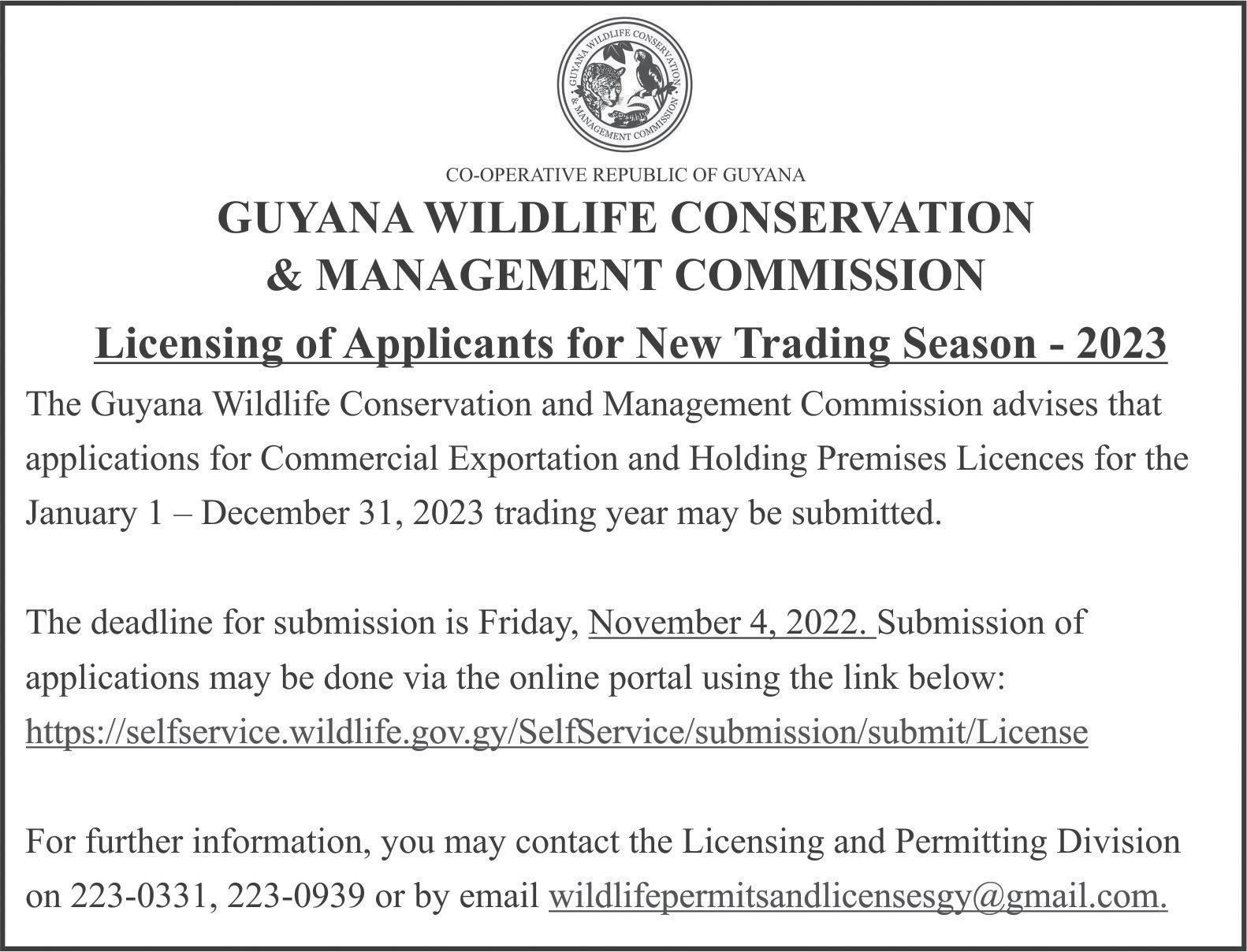


XXIXCHRONICLE PEPPERPOT ― Sunday, October 09, 2022




XXX CHRONICLE PEPPERPOT Sunday, October 09, 2022



XXXICHRONICLE PEPPERPOT ― Sunday, October 09, 2022


XXXII CHRONICLE PEPPERPOT Sunday, October 09, 2022



XXXIIICHRONICLE PEPPERPOT ― Sunday, October 09, 2022


XXXIV CHRONICLE PEPPERPOT Sunday, October 09, 2022


XXXVCHRONICLE PEPPERPOT ― Sunday, October 09, 2022


XXXVI CHRONICLE PEPPERPOT Sunday, October 09, 2022
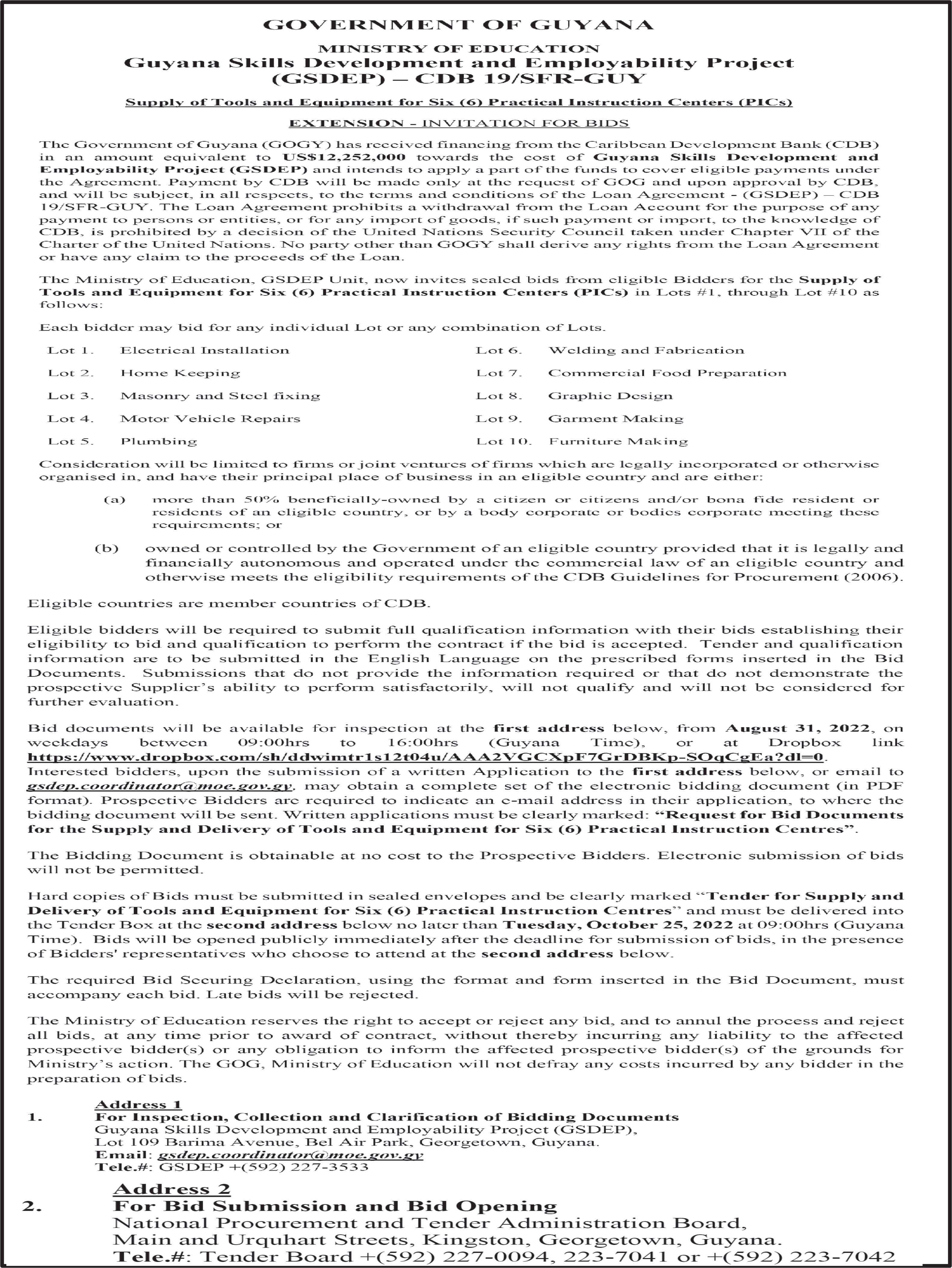
XXXVIICHRONICLE PEPPERPOT ― Sunday, October 09, 2022
THOUGHT FOR TODAY
Slowly, silently, now the moonWalks the night in her silvershoon.
WALTER DE LA MARE (1873-1956) Silver
STUDY SUCCESS
Dear Student, Welcome dear friend. Treat your study as an on going process. Make it effective with constant im provement. With the right study techniques, the skills and approaches, your pro ductivity is sure to soar and even moreso with useful technological apps. And beside your homework planner, rapt class attention,

October 9, 2022
and teacher consultation, have a properly planned study schedule intended with specific management of goals for each study ses sion. Include sleeping time for you. Yes, the right study posture always works. Be wise.
Love you.
GRAMMAR
See how much work can be readily done in one sitting
A.. Test your ability to use verbs by choosing the correct verb form in brack ets in each of the following sentences. [Look out for the solution in the next issue.]
1. Buffaloes (was, were) the word that everyone worked on two weeks ago.
2. A long list of 216 words (was, were) in last week’s Letter Scramble solution.
3. Either one word or a list of words (is, are) good for the occasion.
4. SPAR is one of the words that (was, were) in Inez’s crossword solution.
5. No shoes, hat, or tie (was, were) in Johnny’s locker.
6. No paper, pen, or pen cils (was, were) in Sandra’s possession.
7. Genevieve and Jean’s friend (was, were) the school language club’s president.
8. Annie, not Burnie’s friends, (was, were) respon sible for the lost Foreign Language file.
9. Godfrey, not Nicole’s brother, (was, were) featur ing in the carnival.
10. Dick reported that a long list of retrenched work ers (was, were) gathered outside the compound.
B.. Read the NINE sen tences through to note their variety in structure. Then Choose the correct verb form from those supplied in brackets. [Look out for the solution in the next issue.]
1. Every father, mother, and teacher in this small village (is, are) contributing toward our education drive.
2. Many a one (has, have) attempted that dreaded examination and somehow succeeded.
3. More than one child in a family (has, have) lots of problems with the English Language grammar.
4. More teachers than one (has, have) failed to
correct these problems.
5. I know of one who (has, have) spent most of her career trying to be of help and succeeded much.
6. Do you know of any one who (has, have) good mastery in all his or her major subject areas?
7. It (was, were) the chil dren who paid much atten tion to their schoolwork that did well at their external examinations this year.

8. The successful chil dren (was, were) those who had parents also interested in their welfare.
9. The children, not the older people, (is, are) the ones who must make up their mind to work harder while in school.
ABRIDGED PASSAGE
Use the questions below the passage as guidelines for a better understanding of the passage.
The whole cabin was ablaze. Leaping from his bunk, and dragging the blan kets with him, he sprang to the door, tore it open, and rushed out into the snow. ... According to custom, he had been sleeping almost fully dressed. ...
Outside in the snow Pete Noel stood, blinking through scorched and smarting lids at the destruction of his shack. For a second or two he stared down at the things he clutched in his arms, and wondered how he had come to think of them in time. Then, realising with a pang that he needed something more than clothes and a ri fle, he flung them down on the snow and made a dash for the cabin, in the hope of rescuing a hunk of ba con or a loaf of substantial woodman’s bread. Before he could reach the door, a flicker of flame shot out and hurled him back, half-blind ed. Grabbing up a double handful of snow, he buried his face in it to ease the smart. Shaking himself, he coolly carried the treasures he had saved back to a safe distance from the flames, and resting on the blankets, he pulled on his larrigans. ...
A man who lives alone in the great solitude of the forest has every chance to become a philosopher. Pete Noel was a philosopher. In
stead of dwelling upon the misfortunes which had smit ten him, he chose to consider his good luck in having got out of the shack alive. When he put on his coat, he noted with satisfaction, that his spacious pockets contained matches, tobacco, his pipe, his heavy clasp-knife, and his mittens.
Something to Do
1. Next, Pete Noel will: (a) give up hunting; (b) get to the nearest shelter; (c) build a new cabin; (d) put out the fire.
2. The things Pete Noel had saved were called trea sures because: (a) they were worth a good deal; (b) he owned very few things; (c) they could save his life; (d) he had only saved a few.
3. In Pete Noel’s pockets were: (a) tobacco, nails, a knife, pipe, and mittens; (b) a pipe, mittens, bread, matches and tobacco; (c ) tobacco, matches, bread, nails, and mittens; (d) mittens, a pipe, matches, a clasp-knife, and tobacco.
4. Can you safely say that Pete Noel was in the grip of a nightmare when he woke up in his cabin on fire? Justify.
5. Why did Pete sleep almost fully dressed? (a) He never knew when to expect fire. (b) He wanted to be ready for any danger. (c) It was cold. (d) He was too lazy to undress.
6. Pete Noel is dumb struck; (b) careless; (c) thoughtful; (d) impulsive.
IMPROVING WRITING
Example of contents of letter expressing thanks (a social business correspon dence)
Thanks for a gift
Dear Jennifer, I was pleased to receive the Astroneer Solar System maps you so thoughtfully sent me. They are going to be framed for my office and will look very handsome with the new mahogany panelling.
Thank you for your thoughtfulness. The next time you visit my office, you can see to what good use I am putting your gift.
Yours sincerely,
XXXVIII CHRONICLE PEPPERPOT Sunday, October 09, 2022
Injuries to primary teeth

IT is well known that a person’s dental health is primar ily decided during the pre-school period of that person’s life, with the role played by the parent or guardian being an essential factor. But while tooth decay and gum dis ease are the principal agents that decimate an individ ual’s oral health, traumatic injuries are an important part of this, especially in children.


A recent study of injuries to primary teeth (the first set of teeth) showed children two to four years of age with the highest incidence. Falling against an object has been described as the most common cause of dental injury, and the most common type of injury to primary dentition is displacement. Other studies have shown soft tissue injuries and enamel dentine fractures to be the most prevalent.
Clinical evaluation of the injured preschool child can be difficult because the dentist is often dealing with distraught parents and a frightened and uncooperative child at the most inconvenient times of the day or even night.
Crown fractures of primary teeth involving enamel only are usually restored or filled. All that is needed is a slight recontouring of the biting edge to improve aesthet ics. However, the involvement of dentine in the crown fracture necessitates res toration to seal the exposed den tinal tubules that contain nerve endings.
Because of short roots, pri mary teeth root fractures are unusual. The location of a root fracture in a primary tooth usually determines the outcome. Only when the X-rays show that the tip is broken should the tooth be treated. When the fracture is closer to the crown, the tooth is usually very shaky and has to be extracted.
Sometimes a child may suffer a blow to a tooth without it being displaced from its normal position. The structures supporting it would be injured. This condition is sometimes called a concussion. The tooth is usually tender to biting pressure and may be shaking, with bleeding occurring around the crown.
No treatment is indicated other than the slight filing of the chewing surface if the child complains of biting sensi tivity. Mobile teeth generally tighten up on their own after a few weeks. The parent should be instructed to give the child a soft diet and a progress back to normal foods according to the child’s tolerance. The future for concussed teeth is good.
Displacement occurs more frequently than the crown or root fracture because of the resiliency of the alveolar bone and the short roots. These injuries may be extrusive (the tooth being knocked straight outward), lateral or intrusive (driven deeper into the jaw bone). In most cases these displaced teeth have to be removed. The dentist analyses the clinical picture before deciding to extract the displaced tooth.
Trauma to temporary teeth can cause psychological affliction to the child, unlike an adult. If these teeth re quire more than six months to be replaced by the under lying permanent ones, special effort should be made to preserve them in the dental arch. Failure to do so could result in crowding (riders) and malocclusion (abnormal bite) unless a space retainer (a type of denture) is fab ricated for the child. Parents should seek professional advice on extraction or any other proper recourse so that any hasty action would not be regretted.
XXXIXCHRONICLE PEPPERPOT ― Sunday, October 09, 2022

XL CHRONICLE PEPPERPOT Sunday, October 09, 2022








































 By Michel Outridge
By Michel Outridge






















































































